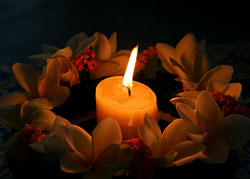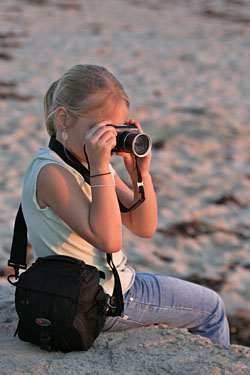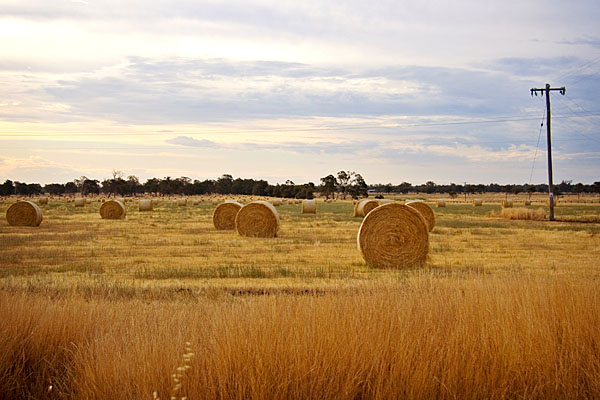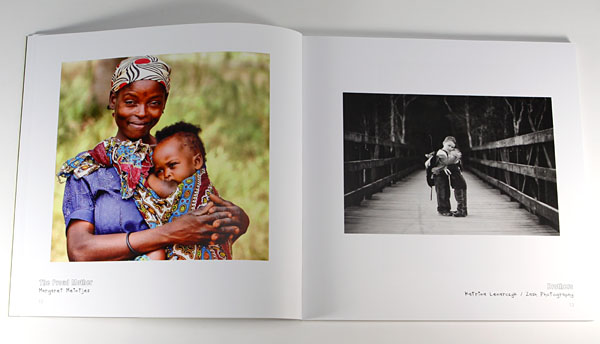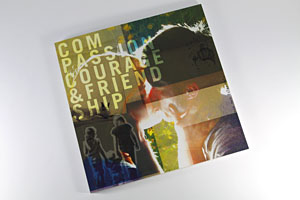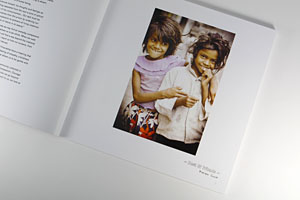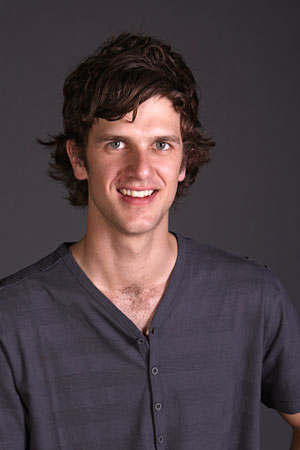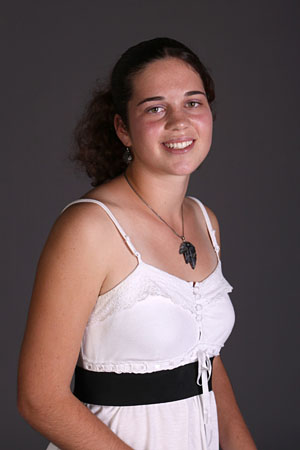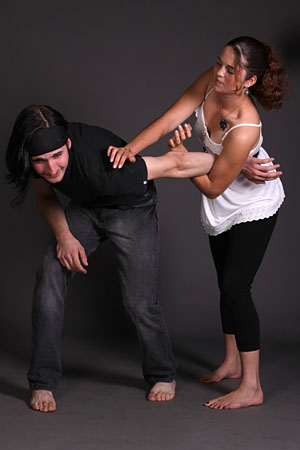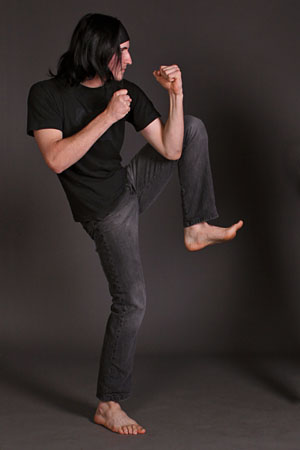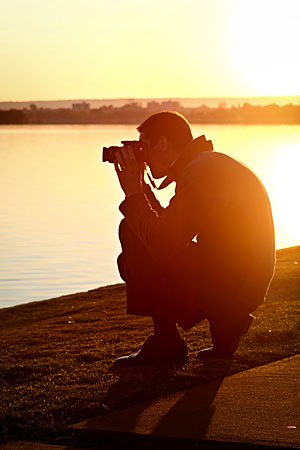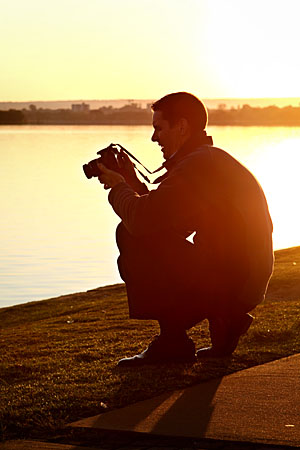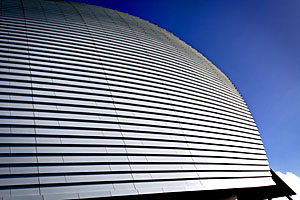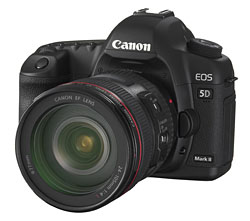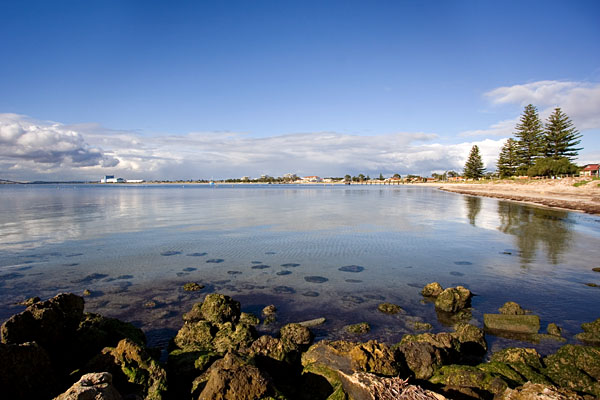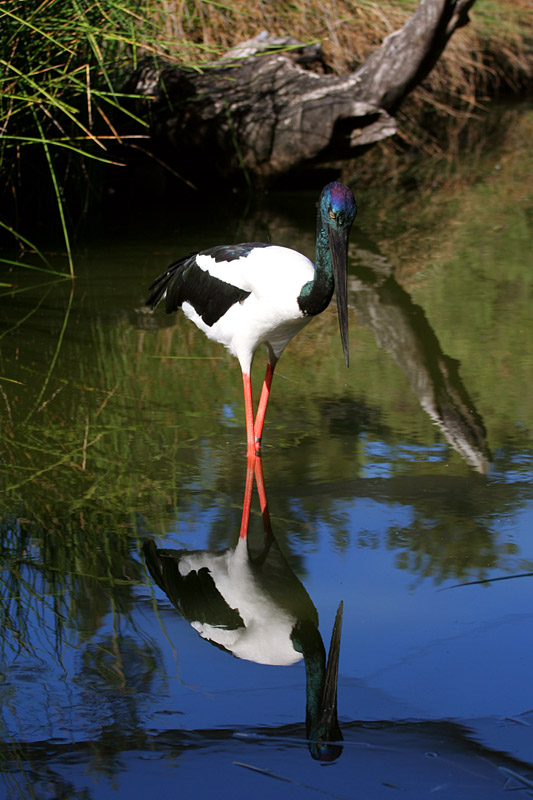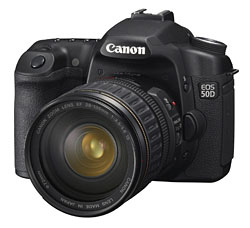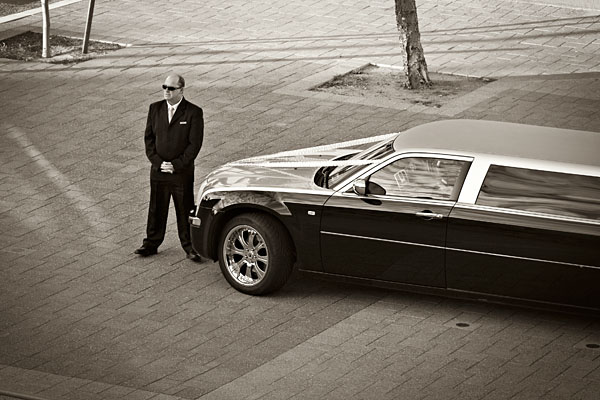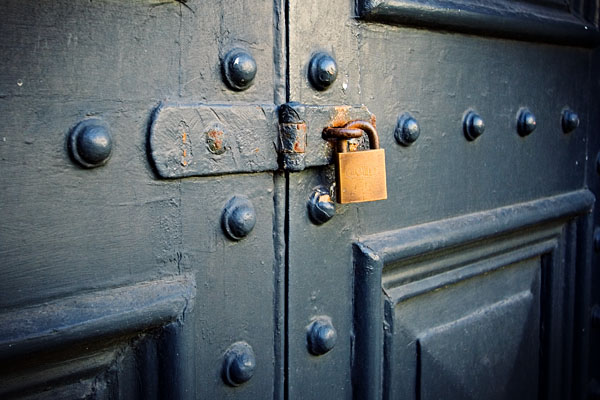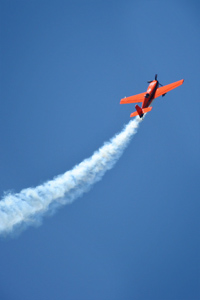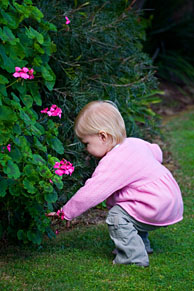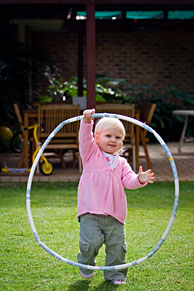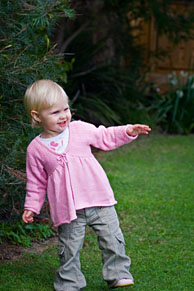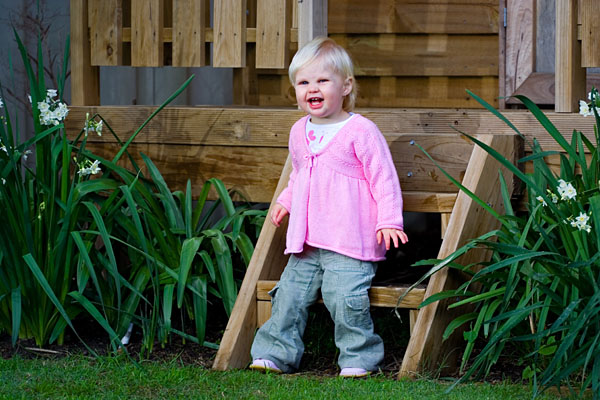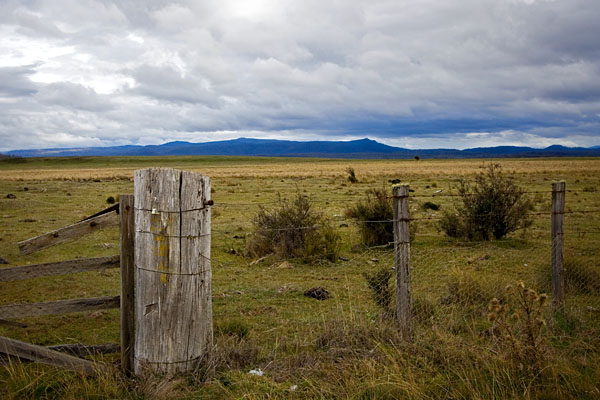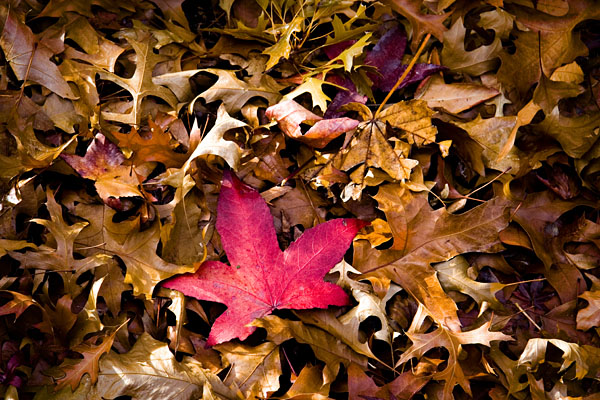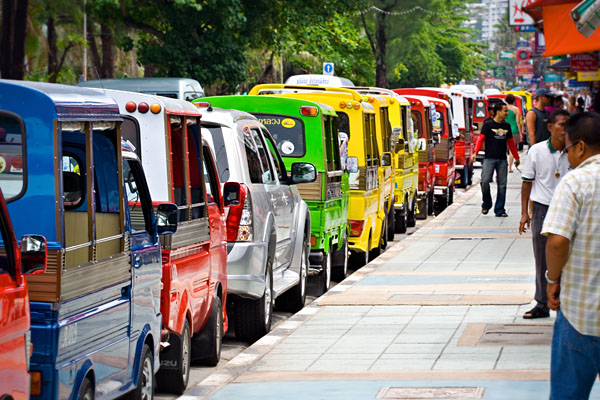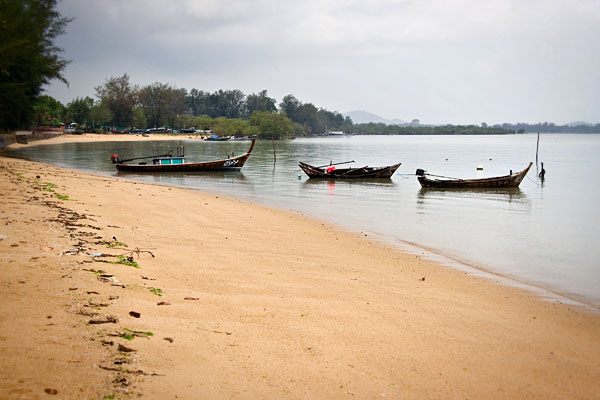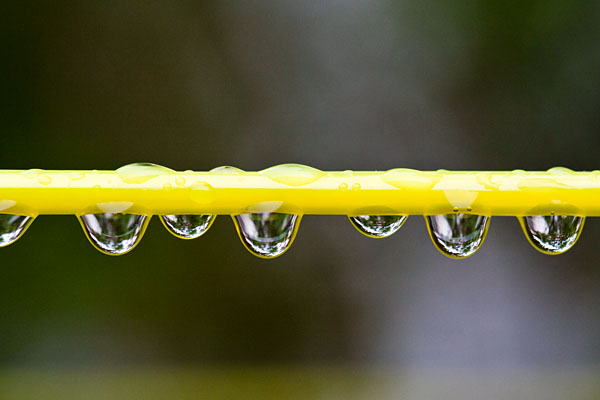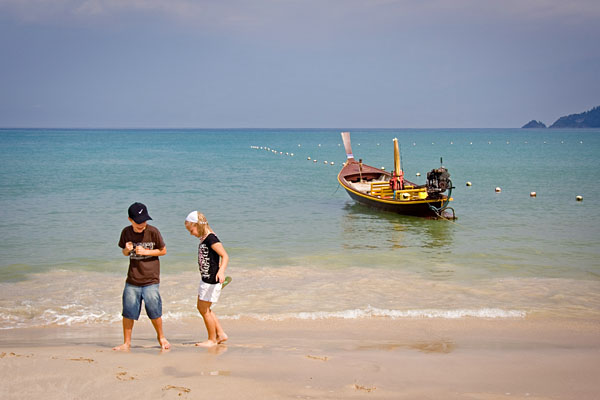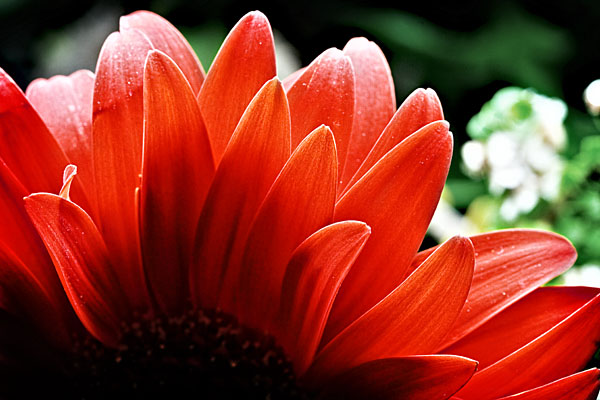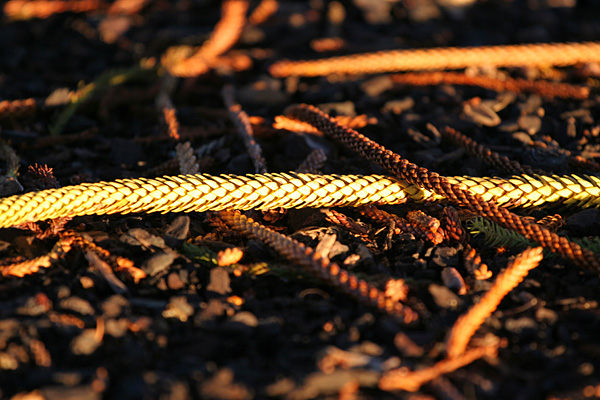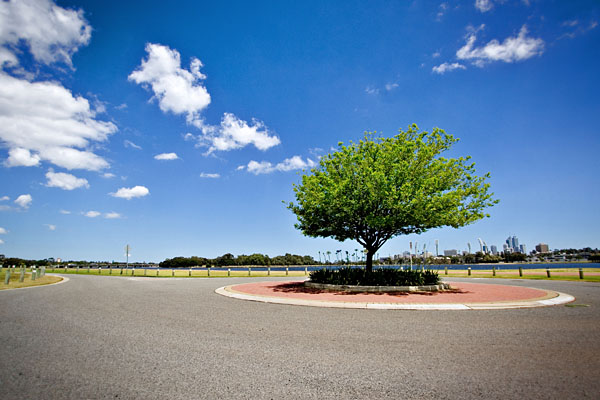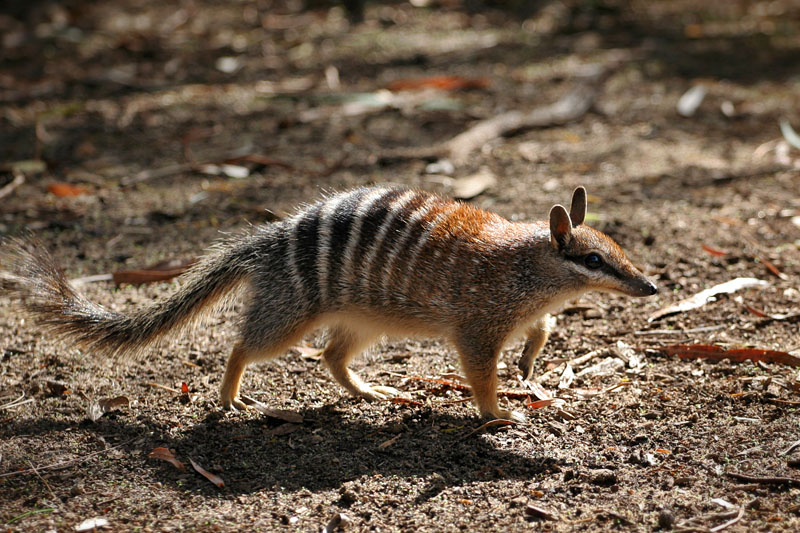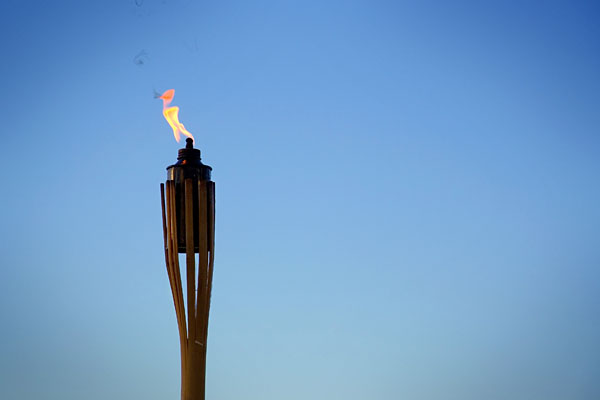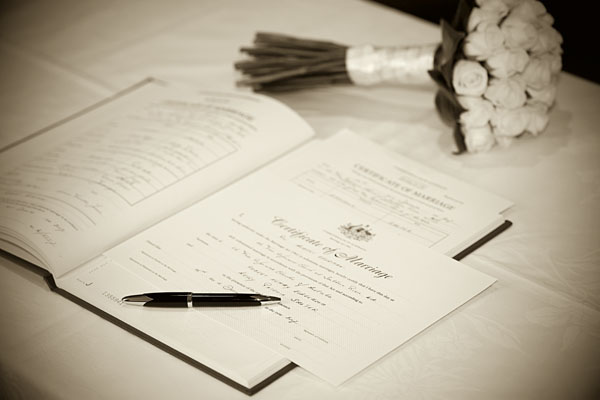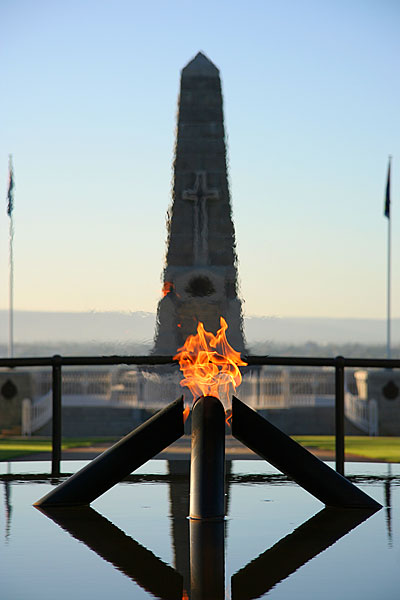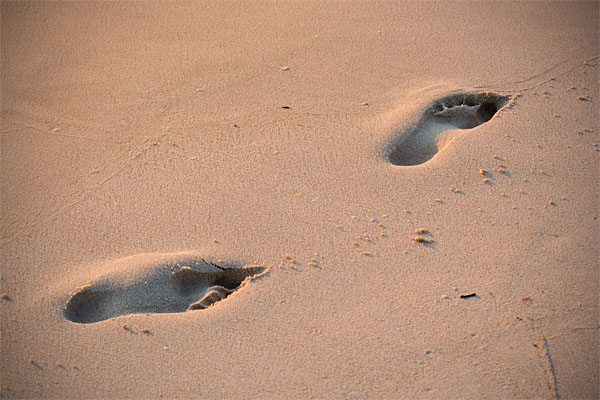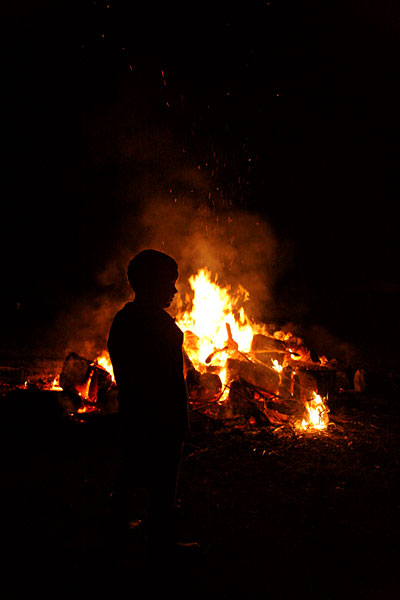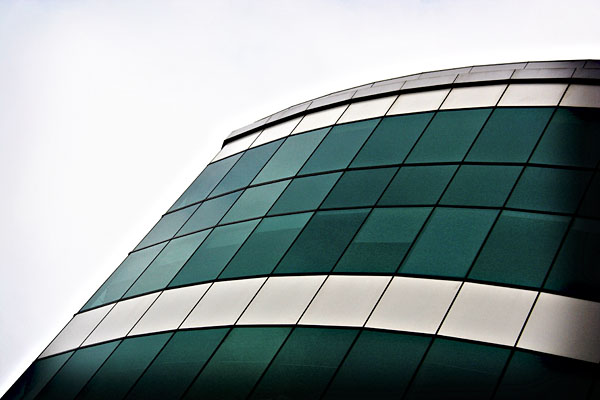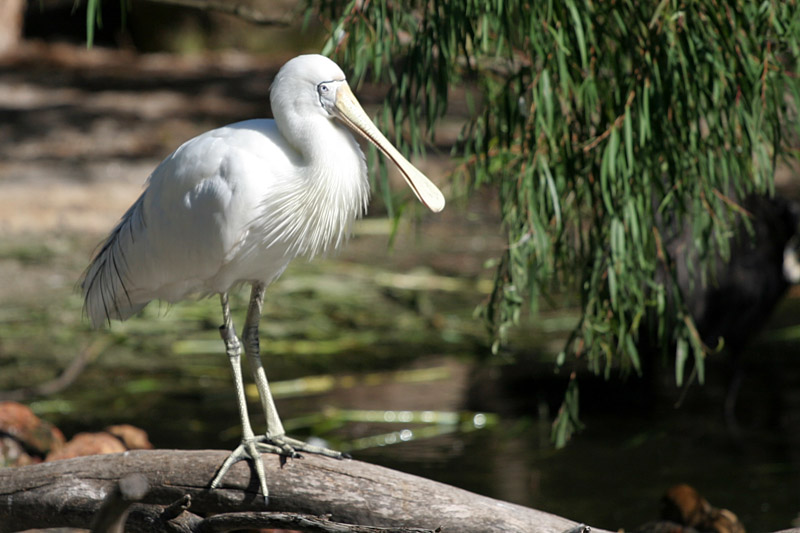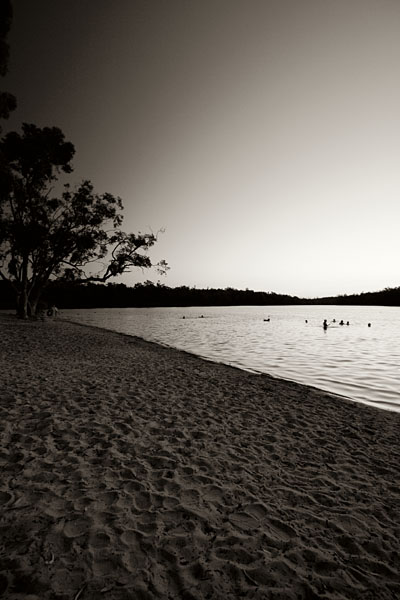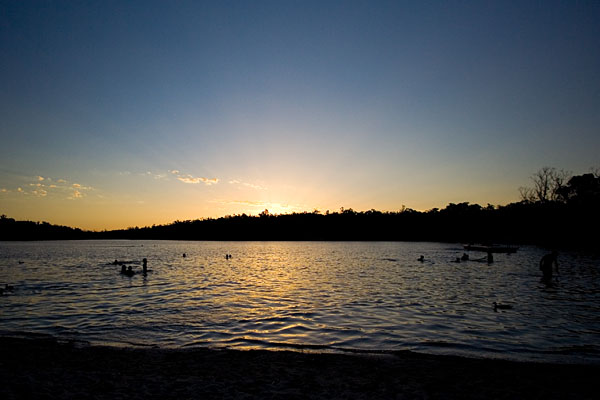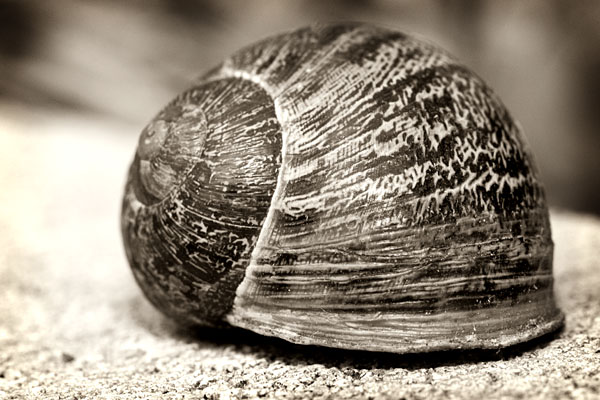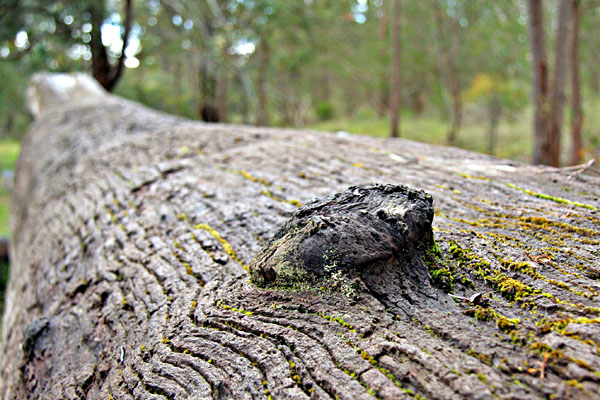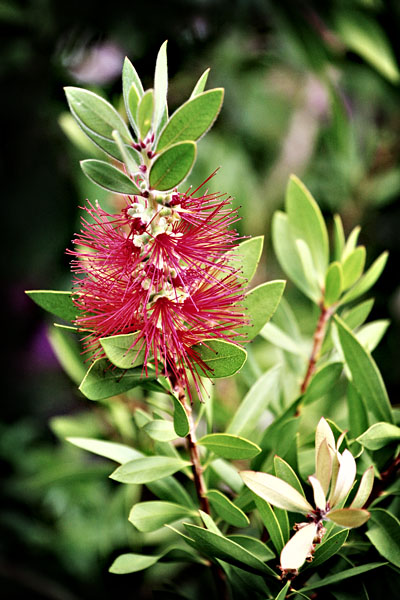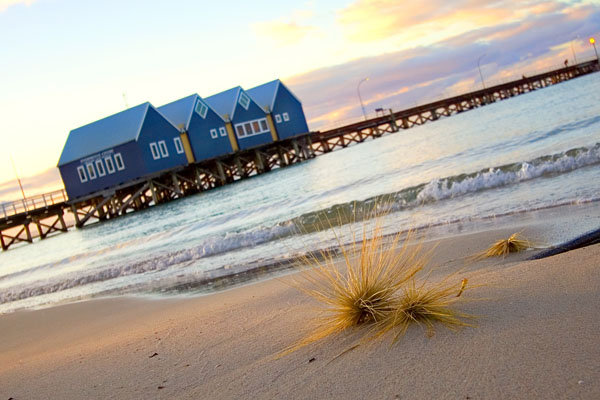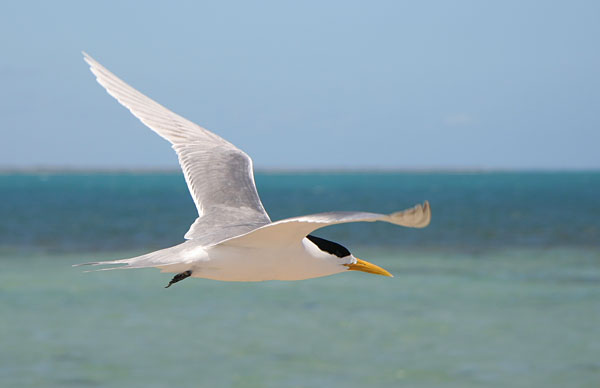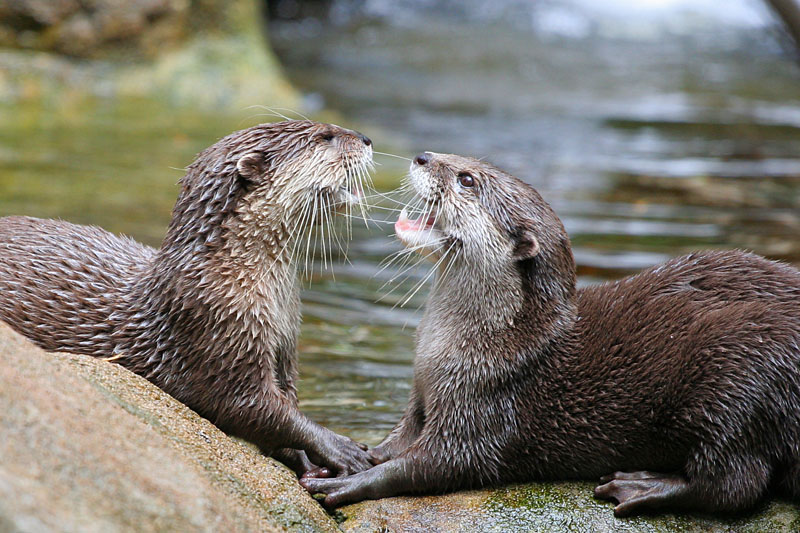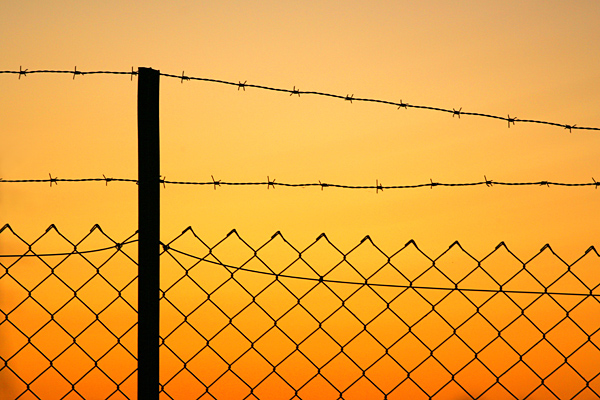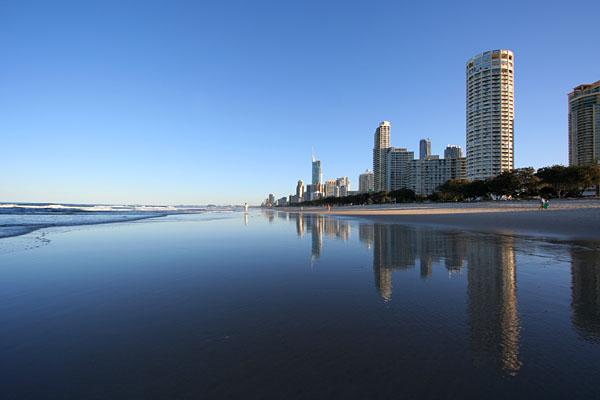posted Wednesday, 31 December 2008, 13:16 (+0800), by Martin
|
posted Tuesday, 30 December 2008, 15:18 (+0800), by Martin
During a visit to
Serpentine Falls
last year with my kids, we saw this white-faced heron fishing in a small waterfall
just below the main falls.
The heron was keeping a close eye on the water flowing past, and managed to catch a couple of small fish while we watched. 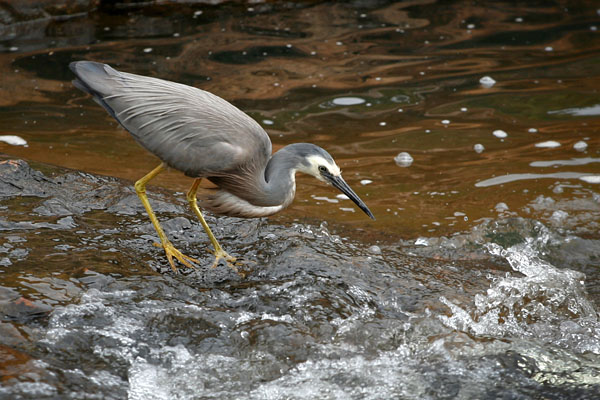
White-faced Heron fishing in the waterfall
Serpentine, Western Australia
Canon EOS 350D, 70-200mm f/4L @168mm, 1/500 sec, f/4, ISO100 For a wider-angle view of the area where the heron was fishing, have a look at this photo, which shows the small waterfall (just below the main falls), and the heron. posted Sunday, 28 December 2008, 13:45 (+0800), by Martin
Looking Back
As the end of 2008 is getting closer, I've been looking back at my blog. It was started in early 2008, and the first post was published on the 3rd of February. At the time, my intention was to share some of my photos, as well as posting articles, reviews and tutorials on various photography-related topics. Looking Ahead
I'm intending to continue in a similar direction, with photos, articles, reviews and tutorials. In 2008, I've also enjoyed a number of photoshoots with friends and colleagues, and hope to do the same in 2009, with our first shoot already planned for early January. Feel free to leave comments if there's any particular topics you would like me to write about in the future, and I'll see what I can do. Word Cloud
Using wordle.net, I generated the word cloud below, using the text of all blog posts this year. The size of each word is proportional to the number of times that word appeared in the text of the blog posts. 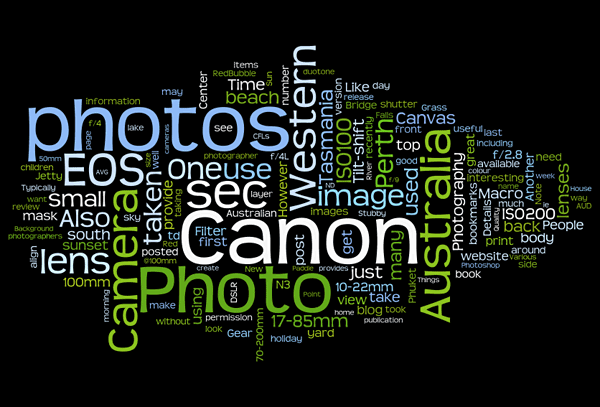
Popular Posts
Below a summary of the 15 most popular posts during 2008 (based on the number of page views between 1 January 2008 and 28 December 2008, as reported by Google Analytics):
posted Saturday, 27 December 2008, 21:25 (+0800), by Martin
Here are a couple of photos from the back yard last month, taken with one of my favourite lenses,
the Canon 100mm f/2.8 macro lens.
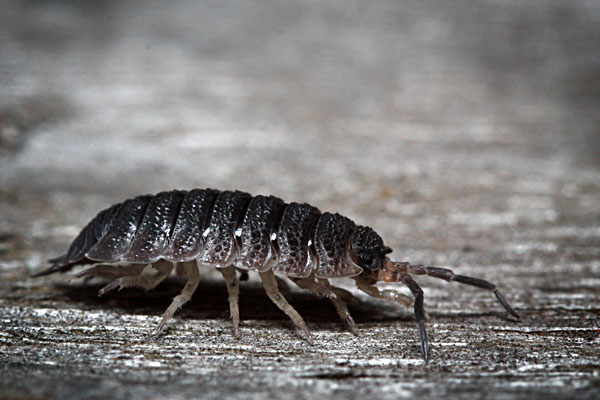
Rough Woodlouse
(Porcellio scaber)
back yard at home, Western Australia
Canon EOS 50D, 100mm f/2.8 macro @100mm, 1/125 sec, f/13, ISO250 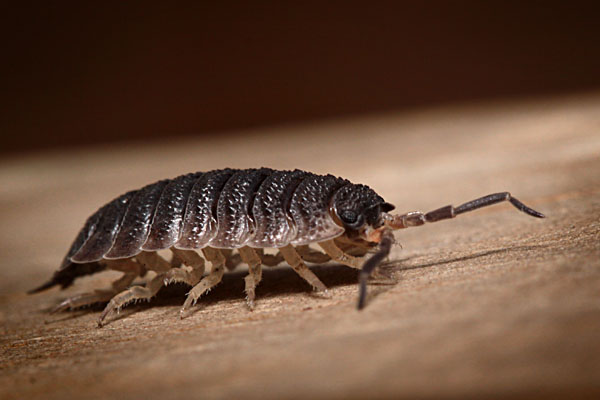
Rough Woodlouse
(Porcellio scaber)
back yard at home, Western Australia
Canon EOS 50D, 100mm f/2.8 macro @100mm, 1/125 sec, f/13, ISO250 This little creature is officially known as a "woodlouse", and the plural term is "woodlice". In Australia, these creatures are commonly referred to as "slaters", and elsewhere, they are known as "pill bug", "roly-poly", or by various other names. Woodlice are actually crustaceans, breathing through gills, and have fourteen jointed limbs, with many different species existing around the world. The scientific name of the one shown below is actually "Porcellio scaber", but it is more commonly known as the "common rough woodlouse" or simply the "rough woodlouse". posted Thursday, 25 December 2008, 10:15 (+0800), by Martin
Someone emailed this to me, and I thought it was quite appropriate,
given the big focus on Santa and gift-giving at this time of the year,
with many people forgetting the true meaning of Christmas.
I believe this poem was originally penned by Rev James Spellman of Ohio (ref).
Why Jesus is better than Santa Claus
Santa lives at the North Pole Jesus is everywhere. Santa rides in a sleigh Jesus rides on the wind and walks on the water. Santa comes but once a year Jesus is an ever present help. Santa fills your stockings with goodies Jesus supplies all your needs. You have to stand in line to see Santa Jesus is as close as the mention of His name. Santa lets you sit on his lap Jesus lets you rest in His arms. Santa doesn't know your name, all he can say is "Hi little boy or girl, what's your name?" Jesus knew our name before we did. Not only does He know our name, He knows our address too. He knows our history and future and He even knows how many hairs are on our head. Santa has a belly like a bowl full of jelly Jesus has a heart full of love. All Santa can offer is HO HO HO. Jesus offers health, help and hope. Santa says "You better not cry" Jesus says "Cast all your cares on me for I care for you". Santa's little helpers make toys Jesus makes new life, mends wounded hearts, repairs broken homes and builds mansions. Santa may make you chuckle but Jesus gives you joy that is your strength. While Santa puts gifts under your tree Jesus became our gift and died on the tree. It's obvious there is really no comparison. Jesus is still the reason for the season. Yes, Jesus is better, he is even better than Santa Claus. posted Wednesday, 24 December 2008, 11:20 (+0800), by Martin
There are two schools of thought on having a UV filter on the front of your lens.
Some people saying it's definitely worthwhile, as it'll protect the lens, while
other people claim it's a waste of time, that the UV filter just serves
to provide a false sense of security, and will degrade the quality of your images.
I have always had a UV filter on each of my lenses, to provide some protection to the front lens element from scratches, fingerprints, and other damage. 
58mm Hoya UV filter on Canon 100mm f/2.8 macro lens
Earlier this week, the camera bag containing my Canon 350D and 17-85mm IS lens was dropped. I didn't think much of it at the time, and it was only later that I noticed the damage. The UV filter on the front of the lens had completely shattered. However, after carefully unscrewing the broken UV filter, and using a blower to remove the tiny shards of glass on the front of the lens, an inspection of the lens' front element indicated no damage to the glass element, or to the filter thread on the front of the lens. The UV filter had protected the lens from any damage. In addition to protecting the glass front element of the lens, the filter also provided protection of the filter thread on the front of the lens. If the glass element had been scratched, it would result in artifacts in any photos taken with that lens, and if the lens' filter thread had been damaged, I wouldn't be able to mount any filters to the front of the lens (ie, circular polarising filter, Cokin Z-Pro ND Grads, etc). It's much cheaper to replace a UV filter, than it is to replace the front element on a lens! I certainly intend to keep a UV filter on the front of each of my lenses after this incident. posted Saturday, 20 December 2008, 20:45 (+0800), by Martin
After seeing this great idea
Rich Legg's blog
a few months ago, I recently headed down to my local pet shop,
and had a pet tag engraved with my contact details, for my camera.
It has my website address on one side, and my name and mobile phone number on the other side. The photo below shows the tag on the strap of my Canon 50D. It's securely attached, and is located so that it won't get in the way. 
add a name tag to your camera
This is the smallest tag that they had available (22mm diameter), and coloured tags are also an option, as well as various assorted shapes. The coloured tags appear to be annodised aluminium, and the engraving would be a little more readable on the coloured tags, as it would expose the bright aluminium underneath the colour. The tags are computer-engraved, and you can choose the font, as well as select a clip-art if desired. The cost was just AUD$11.95, and it took only a few minutes to enter my details into the computer and get it engraved. Tagging your camera in this way ensures your contact details are permanently attached to the camera, and I hope anyone who ever finds my camera, if it goes missing, is honest enough to contact me ;-) posted Thursday, 18 December 2008, 19:40 (+0800), by Martin
One of my colleagues will be spending her last day in our office tomorrow,
as she's off to our Adelaide office for six months or more.
She'll be missed, and our corner of the office will definitely be a quieter place without her ;-)
Here's a shot of her, taken at a local Japanese restaurant earlier this week. 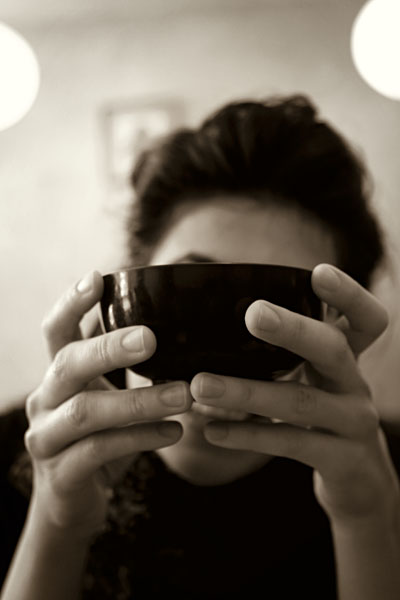
hiding behind a soup bowl
Sushi Station Fuji, Victoria Park, Western Australia
Canon EOS 50D, 24-70mm f/2.8L @28mm, 1/50 sec, f/2.8, ISO640 posted Wednesday, 17 December 2008, 21:00 (+0800), by Martin
Sunset is always a wonderful time for photos, due to the colours, lighting and shadows.
Here's a photo taken at Bathers Beach in Fremantle, where I managed
to capture a seagull silhouette against the sunset sky.
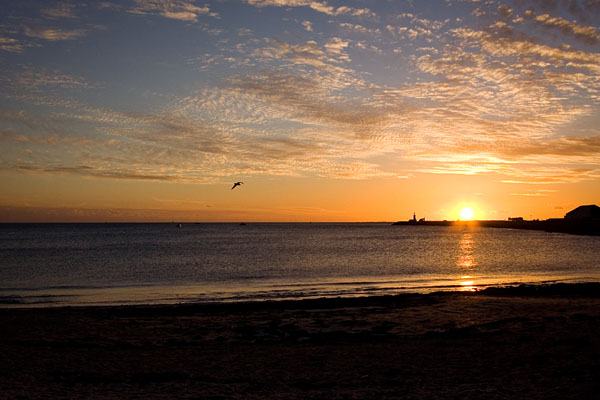
lone seagull in front of the sunset sky
Bathers Beach, Fremantle, Western Australia
Canon EOS 350D, 10-22mm @22mm, 1/400 sec, f/10, ISO200 posted Sunday, 14 December 2008, 12:45 (+0800), by Martin
Having recently written about
getting your kids started in photography,
I decided to sit down with my 10 year old son Ashley, and my 8 year old daughter Michelle,
and get some feedback from them about their thoughts on photography.
Here are the results. Q. How long have you been taking photos? 10yo: Err...I don't know...from when I was about six or seven. 8yo: About two and a half years or something, when I was about six. Q. How did you learn how to take photos? 10yo: My dad told me how to, and I just tried. 8yo: Dad taught me. He taught me how to hold the camera still, how to focus, and how to press the button. Q. How complex was the first camera that you used? 10yo: I just needed to get used to it, and then it was pretty easy. Then other similar cameras are pretty easy to use. 8yo: It was pretty simple. posted Monday, 08 December 2008, 21:50 (+0800), by Martin
With technology continually advancing, digital cameras are becoming cheaper,
with manufacturers packing more powerful electronics into smaller
and cheaper cameras.
I think it's fair to say that most households in western society
would own one or more digital cameras.
Digital photography is great for children, because the ongoing costs are very low, compared to the costs of buying and processing film. When using a digital camera, children also get instant feedback, as they're able to see the photo they've just take on the LCD screen on the back of the camera. 
Point Peron, Rockingham, Western Australia
I introduced my children to photography at a fairly young age, and in this post, I want to share some ideas and suggestions for getting your children into photography. posted Friday, 05 December 2008, 21:10 (+0800), by Martin
A woman selling vegetables on the street side waits for customers.
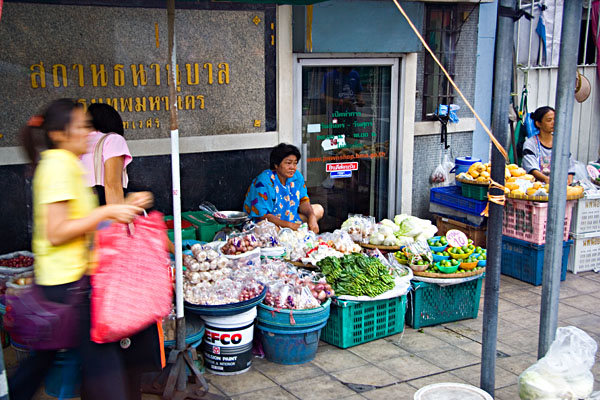
selling vegetables on the roadside
Bangkok, Thailand
Canon EOS 350D, 17-85mm IS @30mm, 1/25 sec, f/4.5, ISO200 This was taken through the window of a moving car during a brief stay in Bangkok in April, while in transit travelling from Phuket back to Perth. posted Wednesday, 03 December 2008, 22:15 (+0800), by Martin
Earlier this week, on Monday night (1st December), the planets Venus and Jupiter aligned
with a crescent moon, to form a celestial smiley face for viewers in Australia
(in Europe and the Americas, these three celestial bodies formed a frowning face).
In the photo below, the planets Venus (top left) and Jupiter (right) form the eyes, and the Moon forms the mouth of a smiley face. 
the Moon, Venus and Jupiter
back yard, Western Australia
Canon EOS 50D, 70-200mm f/4L @200mm, 1/15 sec, f/5.6, ISO320 Apparently the next time these planets and the moon will be so close in the sky is in November 2052, although Venus and the crescent moon will be close together again on New Years Eve. To provide some scale, the distances from the earth to these two planets and the Moon were as follows on Monday night:
1AU is a unit of measure called an astronomical unit, and it's equal to the distance from the Earth to the Sun, with an approximate value of 150 million km (93 million miles). These distances were calculated using the distance information from Stellarium, free open-source planetarium software for your computer, using the planet locations at approximately 9pm on Monday night. If you're interested in stargazing and astronomy, I can highly recommend Stellarium. posted Wednesday, 03 December 2008, 21:35 (+0800), by Martin
This is another photo tilt-shifted using the technique described in
Faking Tilt-Shift - a Tutorial for Realistic Miniaturised Photos.
This is the famous Busselton jetty, which is the longest wooden jetty in the Southern Hemisphere, and is apparently one of the most photographed man-made structures in Western Australia. This photo was taken from the top of the Jetty Point Lighthouse, and the tilt-shift focus point was set as being the blue buildings that make up the Interpretive Centre. 
Busselton Jetty tilt-shifted
Busselton, Western Australia
Canon EOS 350D, 17-85mm IS @33mm, 1/200 sec, f/9, ISO100 posted Wednesday, 26 November 2008, 18:35 (+0800), by Martin
While in Tasmania earlier this year,
we visited Cradle Mountain, and walked around Dove Lake.
The Tasmanian temperate rainforest is a damp place, with almost every surface covered
in moss and greenery.
This photo was taken during the walk around Dove Lake in an area called the Ballroom Forest, and brings back great memories of the Tasmanian rainforest. 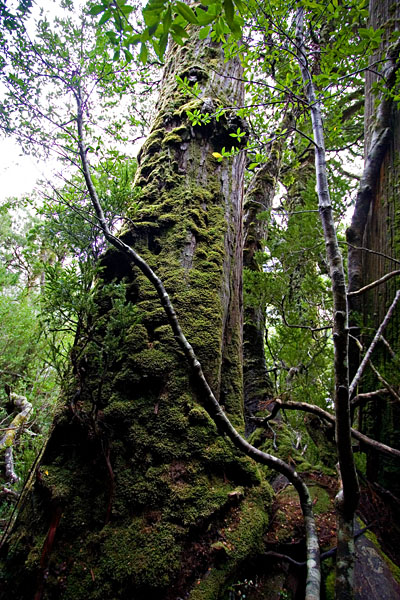
moss-covered tree
Cradle Mountain, Tasmania
Canon EOS 350D, 10-22mm @12mm, 1/25 sec, f/4, ISO400 posted Saturday, 22 November 2008, 20:45 (+0800), by Martin
Background
Until recently, my primary camera was a Canon 350D, which uses a 2.5mm stereo socket (E3) for connecting a shutter release. I built a homebrew shutter release for it, which worked very effectively. Having recently upgraded to a Canon 50D, I can no longer use my homebrew shutter release, as the 50D has an N3 socket, rather than an E3 socket (2.5mm stereo socket). Rather than purchase a complete shutter release for the 50D, I did some research, to see if I could source an N3 connector, so I could modify my shutter release, and add an N3 connector to it. Shutter Release Connections for Canon EOS DSLRs
Canon's low-end DSLR cameras (300D/350D/400D/450D) use an E3 socket for connecting remote shutter releases to the camera. An E3 socket is just a 2.5mm stereo socket. If you want to build your own shutter release, suitable 2.5mm stereo plugs can easily be purchased from most electronics stores. However, the mid-to-high end Canon DSLR cameras (10D/20D/30D/40D/50D/5D/1D) all use Canon's proprietary N3 connector. This post provides more details on the N3 connector, including pinout details, and information on sourcing an N3 connector. The N3 Connector
The images below show the N3 socket on a Canon 50D body (with the protective rubber cover lifted out of the way), and an N3 plug on a third-party shutter release.
posted Thursday, 20 November 2008, 22:00 (+0800), by Martin
I have been tagged by Nick, so here's my responses to "The Five Things Meme": 5 Things I Was Doing 10 Years Ago
5 Things On My To-Do List Today
5 Snacks I Like
5 Things I Would Do If I Was A Millionaire
5 Places I Have Lived (For Various Lengths Of Time)
5 Jobs I Have Had
5 People I Tag posted Thursday, 20 November 2008, 21:45 (+0800), by Martin
Housekeeping
Yesterday I upgraded my blogging software, and did some tweaks to the RSS feed. However, this had the side effect of making FeedBurner think all posts were new, so apologies to those of you who use an RSS reader to track updates to this blog, and saw some posts come through twice. I've also added some FeedFlares to the bottom of each post in the RSS feed, to allow you to more easily share content that you find useful. 
FeedFlairs under each post in the RSS feed
Photoshop Actions
If you've never used actions in Photoshop before, they're a great way to automate repetitive tasks by automating the application of various filters / layers / etc. These free actions allow you to easily apply various post-processing techniques to your photos quickly and easily in Photoshop. Note that some actions will also work in Photoshop Elements - but not all actions, so check the details on each website if you want to use them in Photoshop Elements. DesignReviver has a comprehensive list of 400+ Time Saving Photoshop Actions. CoffeeShop Photography also has a comprehensive collection of free Photoshop actions. I also like Mulletgod's Photoshop Actions - another great set of free actions. Gear News
Rich Legg provides a great suggestion about putting an ID tag on your camera. Are you one of those people who is always checking the lens front element for dust? Do you have a good idea just how visible dust and scratchs on the front element will actually be in your photos? A lens rental company posted some photos to demonstratethe real impact of scratches on a lens front element. Here's a list of 10 neat camera hacks, including an interesting rig for hanging a camera from a kite, a cable camera, and others. Cool Photo Collections
In my web travels, occasionally I'll come across a collection of photos that are particularly appealing, and need to be shared. Here's some I've come across recently. Enjoy these collections!
posted Tuesday, 18 November 2008, 18:30 (+0800), by Martin
Request For Photo Use
I recently received an email from a photo researcher, on behalf of her client, a book publishing company, requesting use of one of my photos ("Numbat" - shown below) for inclusion in a college textbook. The email included some details on how the image would be used (1/4 page), the size of the print run (40,000 copies), and the distribution of the book (US and Canada), and requested details of my reproduction rights for the photo, indicating that if they were approved, I could then submit an invoice. As I've had similar requests in the past, I responded with details of the reproduction rights, as well as a price for the use of the requested photo. The conditions I specified, including the price, were considered acceptable, the photo researcher then requested an invoice, payment was arranged, and I provided a high-resolution copy of the photo. I suspect the photo researcher found my photo in my photo gallery while searching the internet for suitable photos. Selling Photos On The Web
Selling photos in this way can be as easy as described above. You just need to publish your photos on the web, either on any of the many photo-sharing websites, a social networking site, or in your own photo gallery on your website. Tagged each image with appropriate keywords, and an appropriate description, to ensure search engines will know the context of the photo, and can direct appropriate visitors to your photos. It's important to point out that you need to make sure your contact details are easy to find, else a prospective buyer will not be able to contact you to purchase a photo! posted Saturday, 15 November 2008, 21:18 (+0800), by Martin
Early on Friday morning, a few keen souls met near the Old Swan Brewery to
get some sunrise photos.
Once the sun was up, we then made our way up the river to the Crawley Edge Boatshed. This iconic boatshed must feature in a lot of photos, and on weekends, you can often see wedding parties being photographed on the jetty that leads to this boatshed. 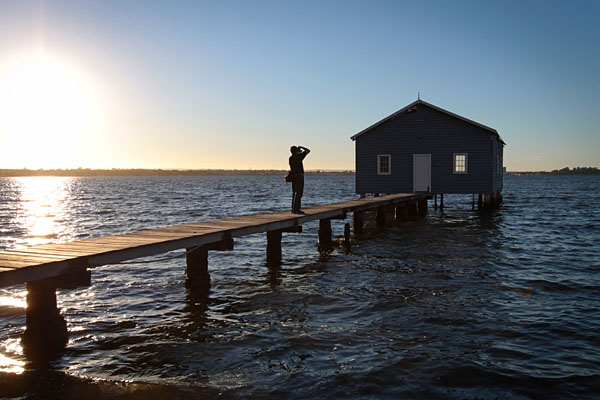
Geoff shooting the 'shed
Crawley Edge Boatshed
Crawley, Western Australia
Canon EOS 50D, 10-22mm @22mm, 1/500 sec, f/6.3, ISO100 posted Wednesday, 12 November 2008, 19:30 (+0800), by Martin
When taking landscape photos, including something in the foreground of the photo
will often improve the composition of the photo.
In this photo, taken at a recent shoot in South Perth, the rocks and pebbles on the shore provide the foreground interest, with the Perth city skyline and its reflection in the Swan River filling the rest of the frame. 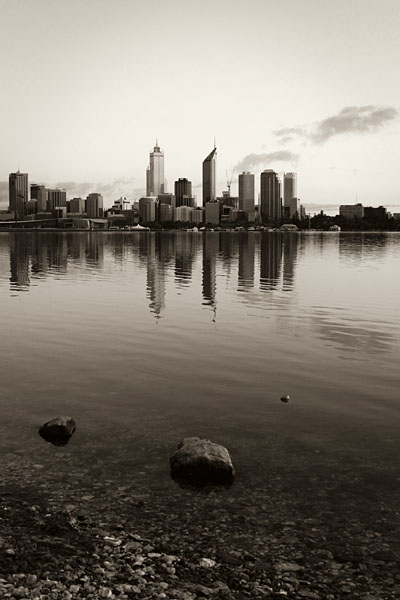
Perth City Skyline in duotone
South Perth, Western Australia
Canon EOS 50D, 24-70mm f/2.8L @24mm, 1/80 sec, f/7.1, ISO400 posted Tuesday, 11 November 2008, 17:45 (+0800), by Martin
Today is
Remembrance Day,
where we commemorate the sacrifices of members in the armed forces and civilians
during war, particularly the First World War.
Remembrance Day is observed by many countries in the Commonwealth, and is celebrated on the 11th of November, because that's the date in 1918 when the First World War ended. 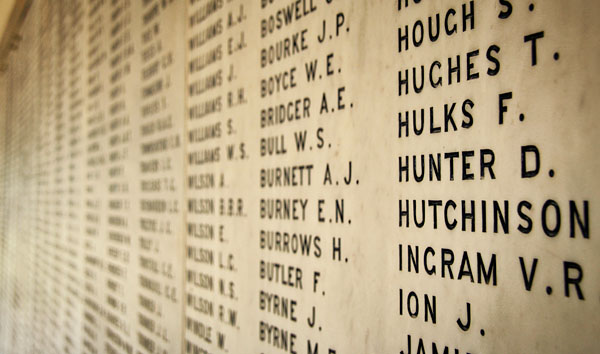
Roll of Honour at the State War Memorial
Kings Park, Perth, Western Australia
Canon EOS 350D, 17-85mm IS @33mm, 1/160 sec, f/4.5, ISO100 We normally try to observe a minute of silence at 11am, but in Australia, Remembrance Day is not a holiday. This morning, I was in the middle of a teleconference with a client at 11am, and didn't have an opportunity to observe the minute of silence (the client was in another timezone, and also didn't consider the fact that it was 11am). Remembrance Day is known as Armistice Day in Europe, and Veterans Day in the United States. posted Monday, 10 November 2008, 19:25 (+0800), by Martin
Some good friends wanted some family photos, so they came around
for a cuppa, and we spent a few minutes in our back yard with the camera.
Here's a photo of their son, Michael. Even though he is in the full sun, the background is suitably darkened to ensure it's not too distracting, and the fill flash helps to reduce the harsh shadows from the bright sun. A duo-tone conversion on this photo, as well as some vignetting, provides a result that draws the viewer's eyes to his face. 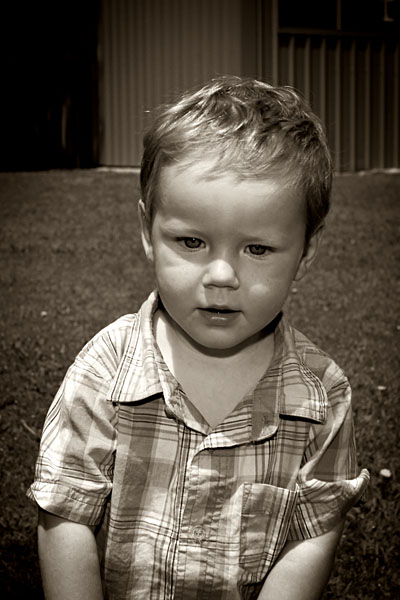
Michael
back yard, Western Australia
Canon EOS 50D, 24-70mm f/2.8L @32mm, 1/400 sec, f/6.3, ISO100 I was shooting in aperture priority, with exposure compensation adjusted down 2/3 of a stop to under-expose the background. To provide some fill light, I had a Canon 430EX flash on the camera, with the flash in TTL mode, also adjusted down 2/3 of a stop. With the shutter speed being faster than the maximum flash sync speed of 1/250, I had to put the flash into high-speed sync mode. posted Saturday, 08 November 2008, 17:07 (+0800), by Martin
Inspired by Todd's
photos created by hanging his camera out the car window while driving
at speed on a gravel road
(recent attempt here,
and an earlier attempt
here),
I had to try something similar when I encountered a gravel road recently.
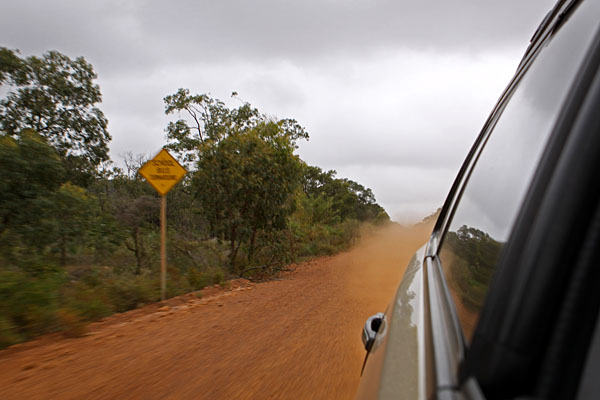
leaving dust in my wake
Yandin Lookout, Cataby, Western Australia
Canon EOS 50D, 24-70mm f/2.8L @24mm, 1/100 sec, f/6.3, ISO125 posted Thursday, 06 November 2008, 18:00 (+0800), by Martin
Here's another one from the Red Bull Air Race qualifying in Perth.
This is Kirby Chambliss in his Edge 540, banking hard after passing through
the start/finish gate.
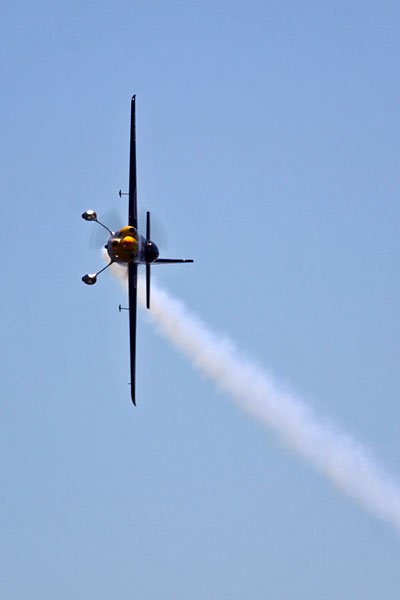
Kirby Chambliss
Red Bull Air Race qualifying
Perth, Western Australia
Canon EOS 50D, 70-200mm f/4L @280mm (1.4x teleconverter), 1/200 sec, f/14, ISO100 posted Wednesday, 05 November 2008, 19:47 (+0800), by Martin
The Red Bull Air Race took place in Perth last weekend.
I spent some time on the river bank in South Perth on Saturday,
shooting the action during the qualifying rounds.
I hired a 1.4x teleconverter for the day, to give me a longer reach, and definitely found it useful. At only $15 per day, the cost of hiring the teleconverter was definitely worthwhile! The planes are great to watch, hurtling at over 300 km/h just a few metres above the river. Here's a couple of my photos from Saturday. 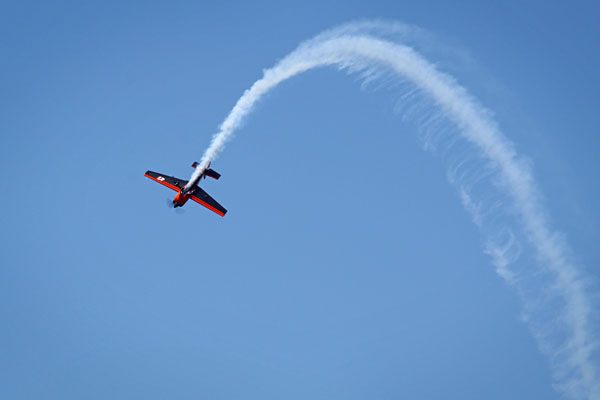
Nicolas Ivanoff executing a half-cuban turn
Red Bull Air Race qualifying
Perth, Western Australia
Canon EOS 50D, 70-200mm f/4L @280mm (1.4x teleconverter), 1/200 sec, f/13, ISO100 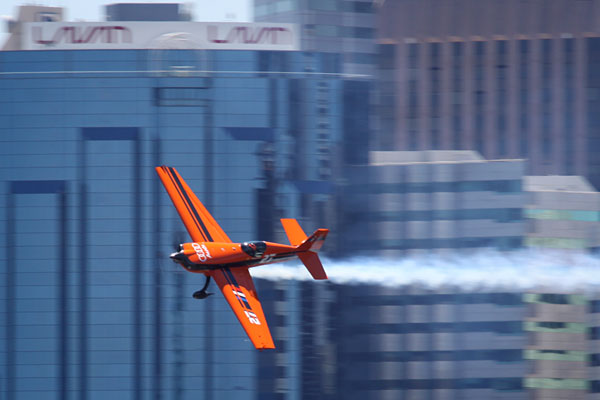
Nicolas Ivanoff
Red Bull Air Race qualifying
Perth, Western Australia
Canon EOS 50D, 70-200mm f/4L @280mm (1.4x teleconverter), 1/200 sec, f/8, ISO100 posted Wednesday, 29 October 2008, 18:55 (+0800), by Martin
I recently spent a couple of days in Cataby for work, and drove up to
Cervantes one evening to watch the sunset from the beach.
A low belt of clouds above the horizon provided some interesting colour,
and I used some dune grass to provide a silhouette in front of the
setting sun.
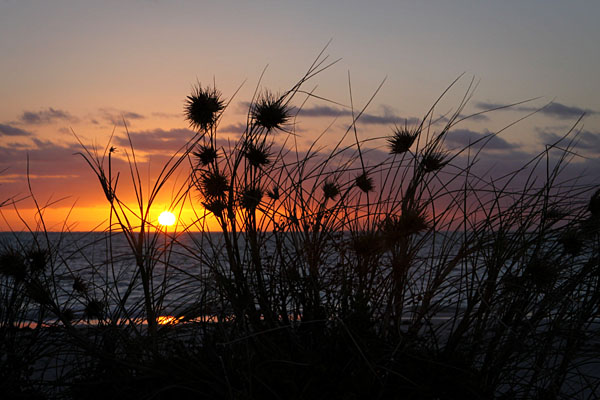
sunset through the dune grass
Cervantes, Western Australia
Canon EOS 50D, 24-70mm f/2.8L @50mm, 1/250 sec, f/13, ISO400 posted Tuesday, 28 October 2008, 18:00 (+0800), by Martin
Earlier today, Canon released firmware
version 1.0.3
for the Canon EOS 50D DSLR camera.
According to Canon's website:
This firmware update (Version 1.0.3) incorporates the following fixes.

The release notes for firmware version 1.0.3 specifically mention a fix relating to "Err 99", but indicate it's related to a timing issue with the shutter button, rather than a hardware issue. In the four weeks since buying a 50D I haven't had any occurrences of the infamous "Err 99". My 50D arrived with firmware 1.0.1 installed, and I've now upgraded it to firmware 1.0.3. I suppose we'll need to see how many 50D users still experience "Err 99" after installing the 1.0.3 firmware, to see if the updated firmware has really addressed the issue. Be sure to read Canon's firmware update procedure when upgrading your firmware, because you don't want to brick your camera! posted Sunday, 26 October 2008, 14:00 (+0800), by Martin
This is a slightly different composition to the
Pelican and the Paddle Steamer Decoy
photo I posted recently, also from our
South Perth photoshoot.
This version brings the Paddle Steamer Decoy and Perth city skyline closer together, allowing the image to be more tightly cropped, without as much empty sky. Click the image below to see a larger version of it to better appreciate it. 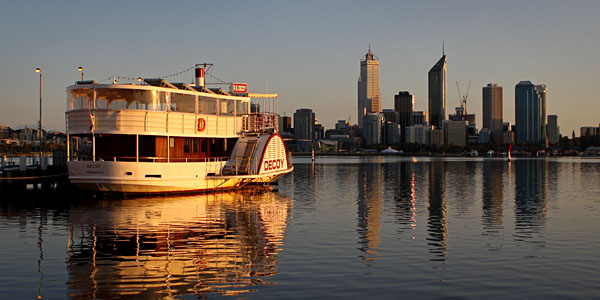
Paddle Steamer Decoy and Perth city skyline
South Perth, Western Australia
Canon EOS 50D, 24-70mm f/2.8L @24mm, 1/1000 sec, f/2.8, ISO100 In hindsight, it's almost exactly the same composition as another photo taken about 12 months ago, but this time, the early morning lighting provided a much more golden glow on the Paddle Steamer Decoy and its reflection. posted Wednesday, 22 October 2008, 20:05 (+0800), by Martin
The post is a follow-up to this review that I published yesterday. I have to admit that the brief review of the Compassion, Courage and Friendship from RedBubble.com that I posted yesterday was written in a hurry, as I wanted to get it published yesterday. I did not get much of a chance to look through the book, but quickly took some photos, jotted down my first impressions, and posted it. Since then, I have let some work colleagues look through the book, and have also had some more time to look through it myself, so I thought I'd post some additional thoughts on it. As mentioned yesterday, the quality of the book is great, with very good colour reproduction on glossy pages. All text is very legible, and the choice of fonts works well, and the cover of the book is a creative creation based on four art items from RedBubble members. The editor has done a great job of trying to keep pages with similar themes together. In most cases, the content (photo, drawing or writing) of the left hand side bears some relation to the content on the right hand side, and definitely helps to provide some cohesion when reading through the book. Most of the photos included in the book are fantastic, with the following ones being my favourites:
posted Tuesday, 21 October 2008, 23:35 (+0800), by Martin
I recently received a pre-release copy of a book titled
Compassion, Courage and Friendship from
RedBubble.com,
an Australian-based company that provides print-on-demand services.
I've previously posted a review of a canvas print from RedBubble.com, and was very happy with the quality of the print. This book is no different, with the presentation and print quality being very good. The book consists of a variety of photos, drawings and writings submitted by RedBubble members. A number of judges chosen by RedBubble staff had the task of narrowing down the submitted material, to determine which items would be included in the book, The resulting book contains 71 submitted items from RedBubble members. With each page containing a single item (photo, drawing or piece of writing), the layout is clean and simple, and the choice of fonts does not detract from the subject material. The reproduction of the photos and drawings is very good, with the colours being represented correctly, and the photos have lost none of their sharpness. (I compared some of the photos in the book with the large versions on the RedBubble website, using a colour-calibrated monitor.)
posted Monday, 20 October 2008, 20:50 (+0800), by Martin
While going through some older photos, I found a few more suitable candiates for
digitally tilt-shifting.
The tilt-shift effect on this photo makes the shipping containers at the Brani Terminal look like
tiny lego blocks.
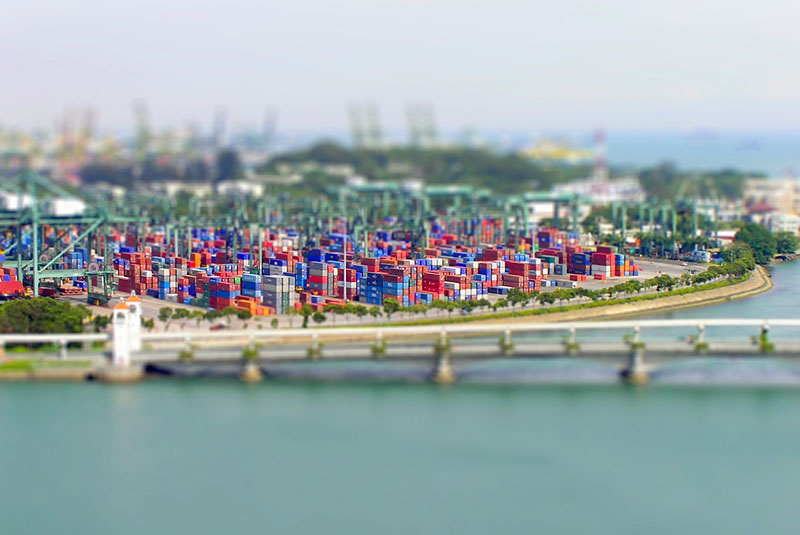
containers at the Brani Terminal on the island of Palau Brani
as seen from Sentosa Island, Singapore
Olympus C-770 UltraZoom @12mm, 1/800 sec, f/5, ISO100 The Pulau Brani island is located between Sentosa Island and the Singapore mainland, in Keppel Harbour. This photo was taken from a lookout on Sentosa Island. posted Sunday, 19 October 2008, 21:20 (+0800), by Martin
On Saturday, I attended a workshop called
"Photographing Real People", conducted by
Greg Perry,
at the
London Photographic Studio in Rockingham.
I was one of 8 students, and Greg spent a few hours talking us through various ways to pose individuals, couples, and groups, and how to interact with the subjects while you're taking photos of them. He threw in plenty of useful tips, tricks and techniques, ranging from lighting suggestions, clothing guidelines for subjects, through to some information on post-processing. We also had the opportunity to put a lot of it into practice immediately, by taking some shots of three models in a studio environment, with Greg providing assistance and commentary. While the opportunity to shoot the models was certainly useful, I believe the value was in the large amounts of practical information shared by Greg during the afternoon. At a cost of $77 for 3 hours, I reckon it was very good value. Here's some of my photos from yesterday afternoon:
London Photographic Studio advertise workshops on their website, and the "Photographing Real People" workshop was also advertised on flickr and redbubble. posted Wednesday, 15 October 2008, 22:35 (+0800), by Martin
The early morning sun highlights the Paddle Steamer Decoy at the Mends Street Jetty,
as a pelican swims past, with the Perth city skyline in the background.
This is another photo from our early morning meet last week. 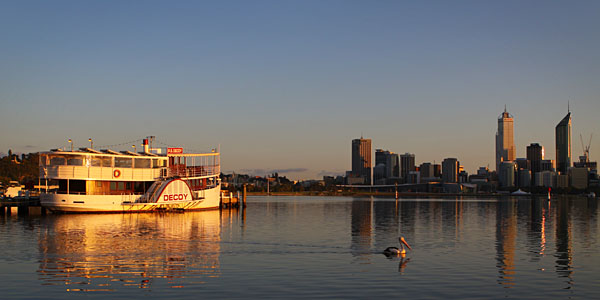
pelican and the Paddle Steamer Decoy
South Perth, Western Australia
Canon EOS 50D, 24-70mm f/2.8L @24mm, 1/320 sec, f/4.5, ISO100 posted Tuesday, 14 October 2008, 20:05 (+0800), by Martin
Here's another photo from
last week.
There were quite a few darters (often mistakenly called "shags" or "cormorants")
along the river's edge early in the morning, drying out their wings in the sun.
The sunlight on the feathers on the outstretched wings drew me to this bird, so I got down low to get the Perth skyline in the background. While I've previously indicated I wasn't sure how useful Liveview would be on my new Canon 50D, in this situation, I found it useful, as I had the camera on the grass, and used Liveview to compose the shot, rather than having to lie down to get my eye to the viewfinder. 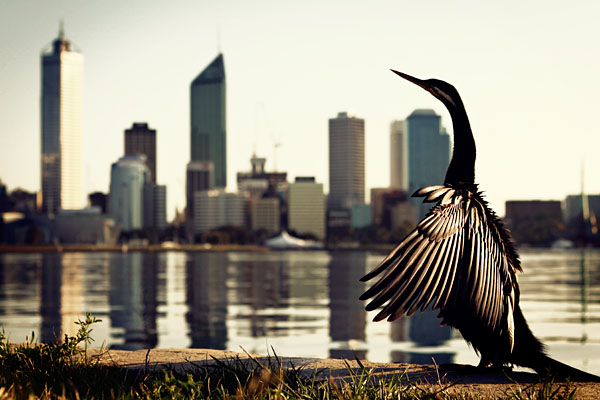
Darter and Perth skyline (vintage gold)
South Perth, Western Australia
Canon EOS 50D, 24-70mm f/2.8L @46mm, 1/640 sec, f/4.5, ISO100 One of the last steps of post-processing this image was the application of an action called "Vintage Gold". It's one of the actions included in Mulletgod's free photoshop actions. posted Monday, 13 October 2008, 21:25 (+0800), by Martin
I like taking photos of silhouettes, particularly if the silhouetted person is
doing something that's quite recognisable and/or easily recognisable.
I've taken photos of photographer silhouettes before, and last week Thursday's photoshoot in South Perth provided another opportunity to get some shots of Bas, one of the other photographers who had joined us. posted Thursday, 09 October 2008, 22:35 (+0800), by Martin
Early this morning, a few keen souls met in South Perth to catch some dawn photos.
We had the following group:
After catching some photos of the somewhat disappointing sunrise,
we wandered up the river to the Narrows, had a hot breakfast
at a nearby cafe, and then headed off to work for the day.
Here's the very first photo I took this morning: 
Perth skyline before dawn
Perth, Western Australia
Canon EOS 50D, 10-22mm @22mm, 15 sec, f/8, ISO100 I'll post more photos from this morning once I find the time to go through them. posted Monday, 06 October 2008, 20:35 (+0800), by Martin
Canon EOS 50D Body
Then Canon EOS 50D body was announced by Canon in late August, just 12 months after the 40D. Historically, Canon has typically waited 18 months between successive releases, and as a result, the 50D was a somewhat unexpected announcement. After having used a Canon 350D (Digital Rebel XT) for two and a half years, I decided it was time to upgrade, and purchased a Canon 50D body just over a week ago. This post isn't intended to be a full review of the 50D, but I'll share my initial thoughts and impressions after using the 50D for a week. Buying Locally vs Buying Overseas
While I've bought photography gear from the US previously because it was significantly cheaper than local prices, this time, due to the Australian dollar slipping, it was cheaper to purchase it locally. I bought the 50D from Gerry Gibbs Camera House in Cannington. They had received their first batch of 50D bodies a couple of weeks ago, but they had all been pre-sold. Their second batch arrived on Thursday 25 September, so they had stock that was immediately available, and I picked one up on Friday 26 September. posted Sunday, 05 October 2008, 14:05 (+0800), by Martin
In response to a
blog post
by Jamie for a meet and greet session for photographers in Fremantle,
a few work colleagues and myself made our way down to Fremantle on Saturday afternoon.
It was a cold, wet and blustery afternoon, and some of us got a little damp making our way to the agreed meeting place at the E Shed markets. If my memory serves me correctly, the following people turned up:
Apparently Jamie and Neal had met at one of Christian Fletcher's workshops, and so had Kirk, Mel and Clint. Sam, Adrian and myself work together, and have been out shooting together numerous times. After introductions and a chat at the E Shed markets, we wandered around Fremantle, looking for the perfect door to shoot ;-) Later in the evening, the majority of the group decided to head across to the North Mole, but as my car was in the opposite direction, and it was getting cold and late, we split up. It was great to meet these guys, and share some stories. I'm certainly interested in getting together with them in the future for some more photography action. posted Sunday, 05 October 2008, 12:25 (+0800), by Martin
Over the last few months, I've blogged a few photos of my youngest daughter, Samantha,
but my other three children have rarely made an appearance on my blog.
Here's some photos of the other three, taken in the back yard a couple of weeks ago. 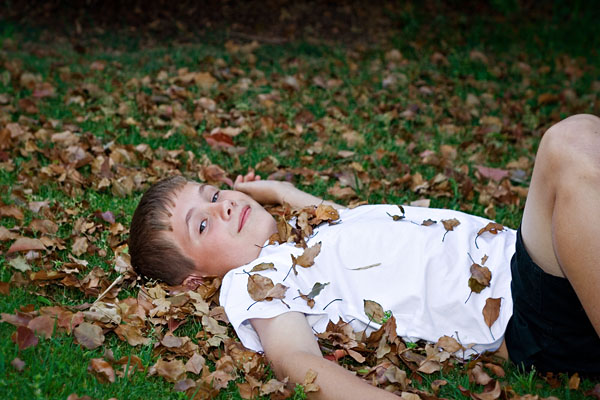
Ashley
back yard, Western Australia
Canon EOS 350D, 50mm f/1.8 @50mm, 1/100 sec, f/4, ISO200 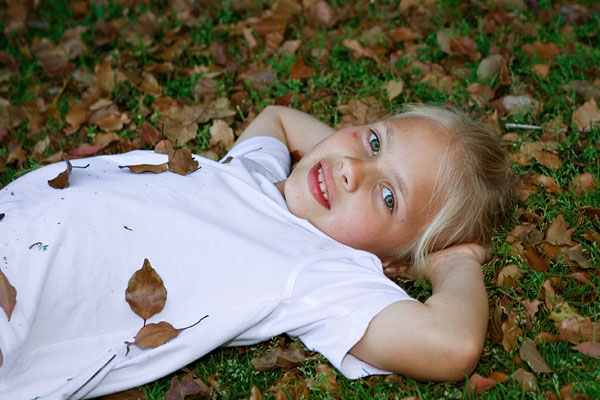
Michelle
back yard, Western Australia
Canon EOS 350D, 50mm f/1.8 @50mm, 1/100 sec, f/4, ISO200 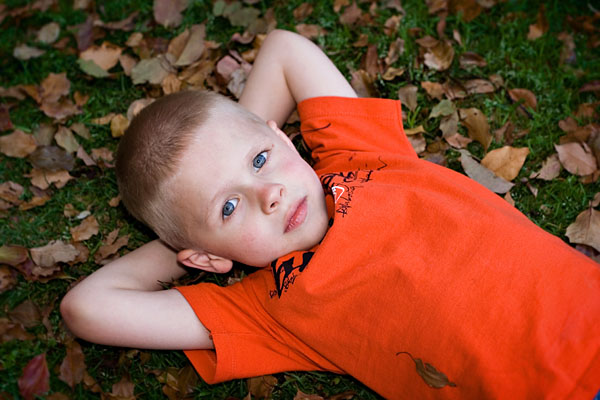
Nicholas
back yard, Western Australia
Canon EOS 350D, 50mm f/1.8 @50mm, 1/100 sec, f/4, ISO200 posted Tuesday, 30 September 2008, 21:40 (+0800), by Martin
Photography gear can be expensive, so when you buy additional gear,
you want to make sure you're not paying too much for it.
Typically, camera gear is cheaper in the US than it is in Australia,
even when taking into account the shipping costs, and depending on the cost,
the GST and customs duty.
As a result, many people, myself included, have been buying camera gear from overseas sellers, including places such as B&H and Adorama. However, with recent changes in the Australian exchange rate, it may not necessarily be cheaper to import items from overseas! Buying From USA
With the Aussie dollar having dropped against the US dollar in the last year or so, it has been cheaper to buy camera gear direct from the US, than it has been to buy it locally in Australia. In July/August 2008, the Australian dollar reached new heights of USD$0.97. In November 2007, I bought the Canon 100mm f/2.8 USM Macro from B&H in New York. Even when taking into account the shipping costs, I still saved approx AUD$250 compared to the local Australian prices. B&H use UPS for shipping items around the world, and the lens was delivered to my door approximately 2.5 working days after the order was placed! Note that because the lens was worth less than AUD$1000, I didn't have to pay any GST or customs duty when the lens arrived in Australia (there's no import duty on photographic gear). posted Saturday, 27 September 2008, 23:55 (+0800), by Martin
Here's a photo of my youngest daughter, while engrossed in her toys.
While processing this photo, I tried converting it to black and white,
but it didn't look right.
However, desaturating it seemed to work better with this particular photo,
so here's a desaturated version:
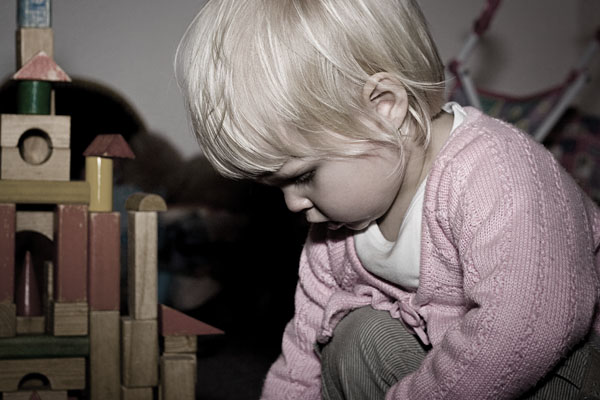
engrossed
(desaturated version)
home, Western Australia
Canon EOS 350D, 50mm f/1.8 @50mm, 1/125 sec, f/5, ISO200 For reference, here's a full colour version, with the saturation slightly boosted to highlight the colours of the wooden blocks on the left hand side. 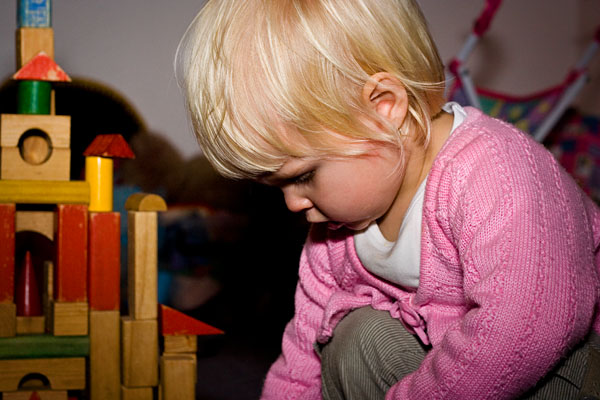
engrossed
(full colour version)
home, Western Australia
Canon EOS 350D, 50mm f/1.8 @50mm, 1/125 sec, f/5, ISO200 Which do you prefer? The full colour version, or the desaturated version, and why? Please leave a comment below indicating your preference and your reasoning. posted Monday, 22 September 2008, 21:40 (+0800), by Martin
There are many websites out there with useful information about photography,
and many photographers regularly posting great photos.
Here's some photography-related blogs that I read on a regular basis (via Google Reader). Hopefully you'll find some of the blogs on this list useful.
posted Friday, 19 September 2008, 19:35 (+0800), by Martin
I've previously written a
detailed review of a canvas print
from RedBubble.com, and
I recently obtained another canvas print from RedBubble.
This time, it was a canvas print of
a photo called "Grazing", taken during our
holiday in Tasmania a few months ago.
Just like the previous canvas print I ordered from RedBubble, this is again the largest canvas print size available from RedBubble, measuring 610mm along its longest side. 
canvas print of "Grazing" hanging on the wall
posted Wednesday, 17 September 2008, 22:40 (+0800), by Martin
Canon 5D Mark II Body
After many rumours, Canon have now announced the Canon 5D Mark II. The key features include 21 megapixel full-frame sensor, expanded ISO range upto 25600, live view, 3.9 FPS, and HD video capability at 1920 x 1080. I think it's a worthy successor to the three-year-old 5D, although I'm not convinced that HD video belongs on a DSLR. For more details, see: DPReview also have an extensive post on the features of the 5D Mark II, including additional photos of the body, and sample images and movie files, as well as a detailed hands-on preview. Canon 24mm f/1.4L II USM Lens
In the same press release, Canon also announced an updated version of the 11 year-old 24mm f/1.4L USM lens. Zeiss EF-mount Lenses
Earlier this week, Zeiss announced manual-focus ZE lenses with EF mounts for Canon bodies. The first lens to be made available will be a 50mm f/1.4 lens, with an 85mm f/1.4 lens to follow later this year. posted Sunday, 14 September 2008, 22:38 (+0800), by Martin
Here's a couple of photos from my brother-in-law's fancy dress party
last month.
All sorts of characters were present - from a Banana in Pajamas, to
Little Red Riding Hood, Cleopatra, through to a (male) Little Bo Peep.
I hadn't been to a fancy dress party for many years, and it was great fun! posted Wednesday, 10 September 2008, 22:05 (+0800), by Martin
This is another photo tilt-shifted digitially in Photoshop to make it
look like a miniature model.
I've previously written about
Faking Tilt-Shift - a Tutorial for Realistic Miniaturised Photos.
This photo was taken at a holiday house in Mandurah a couple of years ago. 
Camry in front of house - tilt-shifted
Mandurah, Western Australia
Canon EOS 350D, 17-85mm IS @38mm, 1/50 sec, f/10, ISO100 posted Tuesday, 09 September 2008, 22:20 (+0800), by Martin
The HMAS Vampire is a decommissioned destroyer at the Australian National Maritime Museum,
in Sydney.
As one of the museum's exhibitions, visitors to the museum can wander around the
120m long HMAS Vampire.
The HMAS Vampire was launched in October 1965, commissioned in June 1959, and spent most of her career in South East Asia, and was eventually gifted to the museum in 1986. 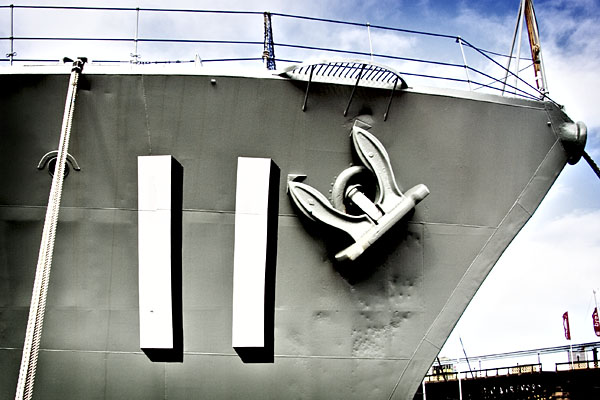
HMAS Vampire
Sydney, New South Wales, Australia
Canon EOS 350D, 17-85mm IS @17mm, 1/400 sec, f/5, ISO100 posted Wednesday, 03 September 2008, 22:15 (+0800), by Martin
Choosing a DSLR body - Canon 50D vs Nikon D90 Comparison
Brian Auer recently posted a comparison of the specifications of the recently announced Canon 50D and the Nikon D90 on his Epic Edits Weblog. The specifications of these cameras are fairly close, and both are targeting the advanced amateur photographer. Brian then asks users to indicate which body they would choose, assuming they didn't have any existing brand loyalty or lenses suitable for either body. At the time of writing, the poll was quite close, with less than 10% difference between the 50D and the D90. A Better Approach to Choosing a DSLR Brand
I believe Brian's approach to choosing a DSLR body is flawed. Someone buying their first DSLR shouldn't look at the specifications of camera bodies from different manufacturers to determine which one to purchase. Instead, you should look at the lenses available for each brand (and to a lesser extent, also look at other accessories, such as flashes, etc). Once you decide which lens series you want to use (based on lens price, features, range, availability, etc), you then pick a body to suit those lenses, based on your budget at that time. Camera manufacturers typically release updated bodies every 18 months or so (with the 50D being only 12 months after the release of the 40D). Updated bodies will have better performance and additional features that make them desirable. You can always upgrade to a higher-spec body and/or newer model of the body at a later date. Even though one brand of DSLR body may have a minor edge over another brand at the current time, that could easily change when each manufacturer releases new versions of their bodies. If you look after them, good quality lenses will last you for many years, and don't become obsolete. Lenses should last you through multiple camera bodies, although there are certainly situations where you may want to upgrade a lens to a better and/or faster lens. How Did You Select Your First Camera Body?
For those readers who have an SLR (not necessarily a DSLR), how did you decide which brand to use (ie, Canon/Nikon/Pentax/etc), and how did you decide which body to purchase? Use the comments below to submit information about your decision process when you purchased your first SLR camera body. posted Monday, 01 September 2008, 19:15 (+0800), by Martin
Here's another photo of the Penitentiary at the historic
Port Arthur site in Tasmania, taken during our
holiday
several months ago.
It was taken from the same location as another photo of the Penitentiary that I blogged some time ago, but this time taken in landscape mode, specifically to include the tree on the left and top, to provide a natural frame. 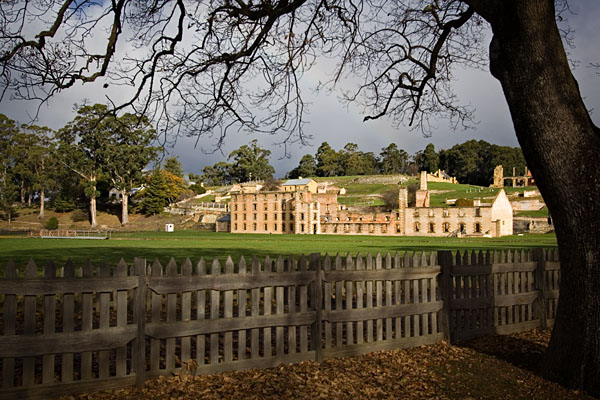
the Penitentiary
Port Arthur, Tasmania
Canon EOS 350D, 10-22mm @22mm, 1/800 sec, f/4.5, ISO100 posted Sunday, 31 August 2008, 14:05 (+0800), by Martin
Canon 50D DSLR
Canon have announced the release of the Canon 50D, as well as the EF-S 18-200mm f/3.5-5.6 IS lens. You can read the official press release on the Canon USA website for more details. A detailed review of the 50D is available at dpreview.com. The 50D annoucement comes approximately 12 months after the release of the 40D, while typically, Canon have waited 18 months between successive releases. There's still no firm details on the 5D replacement, other than plenty of rumours, with the 5D replacement expected to be announced at Phototokina 2008 (23-28 September 2008). Nikon D90 DSLR
Nikon have announced their D90, and one of the much-talked-about features is the ability to shoot video with it. For more details, see Nikon's press release. There's been some interesting responses to the inclusion of video capabilities on the D90. Vincent Laforet also raises some interesting concerns about video on the D90, particularly with regards to events such as the Olympics, where tv companies won't be too happy with the idea that photographers can shoot high-def video with their still cameras. Fuel Cells to Power Future DSLRs
Canon are apparently working on powering a DSLR with a fuel cell. They're looking at using the fuel cell to not only power the DSLR, but also external accessories including lenses, flashes, etc. Great Photo Collections
Here's 41 Amazing Tilt-shift miniature faking photographs that are definitely worth looking at. Tilt-shift faking involves digitally applying a tilt-shift effect to a photo to give it the appearance of being a photo of a miniature model. I wrote a tutorial on how to fake tilt-shift in Photoshop to create realistic miniaturised photos a few months ago. Here's a great collection of creative photos by Chema Madoz, where he takes ordinary every-day items, and uses them in interesting ways as props for his photos. And finally, here's some great collections of photos from the Olympics: posted Thursday, 21 August 2008, 21:49 (+0800), by Martin
Taken during a
boat cruise
on the Tamar River, in Launceston, Tasmania.
The stark shape of the silos against the dark stormy clouds drew me to this, and the reflection of the silos in the river balances the image. 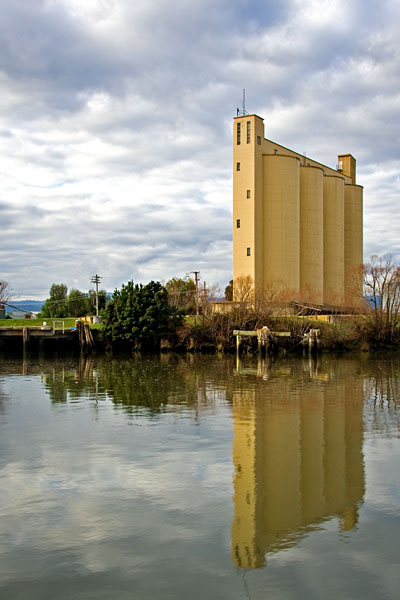
Tamar River reflections
Tamar River, Launceston, Tasmania
Canon EOS 350D, 17-85mm IS @26mm, 1/50 sec, f/11, ISO100 posted Tuesday, 12 August 2008, 20:55 (+0800), by Martin
More on the Beijing Olympics Opening Ceremony
Not only were some of the fireworks faked, but the little girl who sang as the flag entered the stadium was lip-syncing to another girl's pre-recorded singing. A Windows Blue Screen Of Death was also spotted at the Bird's Nest stadium during the opening ceremony. Interesting Photos
On a non-Olympics note, some people have re-enacted childhood photos, with interesting results. Here's a collection of 60 amazing pictures you should see on flickr. And finally, here's a great collection of 60 incredible aerial photos you must see. posted Monday, 11 August 2008, 09:15 (+0800), by Martin
While out shooting in Fremantle on Saturday evening, one of my kids pointed out
the reflected sunset sky in a window. We all took some photos of this window,
and this was the best of the photos I took.
I love the contrast between the bright colours of the reflected sunset, and the dark colours
of the corrugated iron of the building.

reflected sunset sky
Bathers Beach, Fremantle, Western Australia
Canon EOS 350D, 17-85mm IS @85mm, 1/15 sec, f/5.6, ISO200 posted Sunday, 10 August 2008, 10:10 (+0800), by Martin
Photos from the Beijing Olympics
The Beijing Olympics is garnering a lot of media attention, and there's plenty of photos showing up on the web. Here's a selection of great photos from the Olympics:
Photography Blogs from the Beijing Olympics
Quite a few photographers in Beijing to cover the Olympics are blogging about their experiences, and here's a few interesting stories:
posted Friday, 08 August 2008, 21:15 (+0800), by Martin
For some reason, many people seem to take photos of pegs on a clothes line when
first using a lens with a wide(ish) aperture.
I took this photo when I first got the 70-200mm f/4L lens last year,
taken with the aperture wide open, and at full zoom.
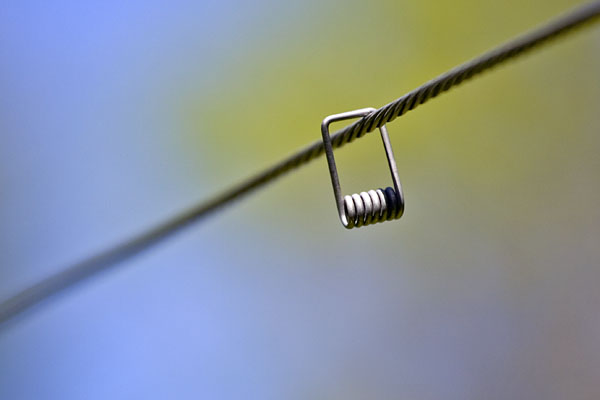
hanging around
back yard, Western Australia
Canon EOS 350D, 70-200mm f/4L @200mm, 1/1250 sec, f/4, ISO100 posted Wednesday, 06 August 2008, 21:05 (+0800), by Martin
Taken late one afternoon at Rockingham Beach, this shot shows the interesting shadows created by
the corrugations in the sand on the ocean floor.
The blue and white structure in the distance on the left hand side is the Kwinana
Grain Terminal.

shadows in the water
Rockingham Beach, Western Australia
Canon EOS 350D, 10-22mm @10mm, 1/200 sec, f/10, ISO100 posted Sunday, 03 August 2008, 16:00 (+0800), by Martin
This is the second cascade at Liffey Falls, in Tasmania.
It's one of several cascades that is upstream from the
main falls,
along the walking track from the top carpark.
It's a shame about the branch in the middle of the frame, but my options for composing this shot were very limited, due to the need to use a tripod, and the fact that there wasn't anywhere else on the steep river bank to stand. 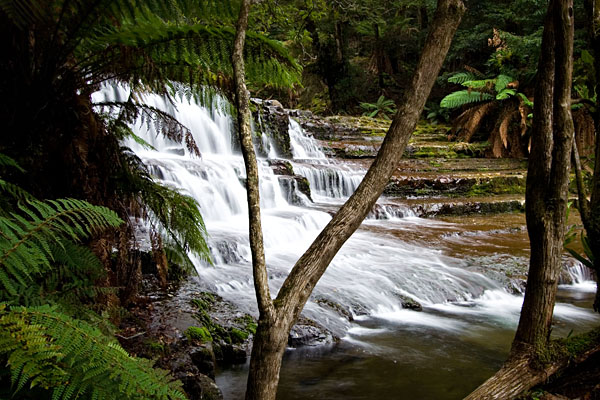
Second Cascade at Liffey Falls
Liffey Falls, Tasmania
Canon EOS 350D, 10-22mm @21mm, 8/10 sec, f/11, ISO100 posted Sunday, 03 August 2008, 14:55 (+0800), by Martin
Here's a summary of the 10 most popular posts during the month of July:
posted Saturday, 02 August 2008, 12:15 (+0800), by Martin
Here's an overview of all the photos I blogged during the month of July.
Some more photos from our
Tasmanian holiday
feature again, as well as some photos of my youngest daughter, Samantha.














Click any image to navigate directly to that blog post. A review of a canvas print from redbubble.com proved to be particularly popular:
Some of the other posts from July include:
posted Wednesday, 30 July 2008, 21:45 (+0800), by Martin
A wide-angle lens can be great for capturing cars from interesting angles.
With this particular photo, I wanted to capture the mud on the side of the car,
as well as the dark and threatening sky overhead.
Holding the camera low down, with the 10-22mm lens, allowed me to capture the car, road, and plenty of interesting sky. 
dirty car
central Tasmania
Canon EOS 350D, 10-22mm @14mm, 1/200 sec, f/8, ISO100 posted Tuesday, 29 July 2008, 21:08 (+0800), by Martin
New Toy Arrives
I recently purchased a Cokin Z-Pro U960 ND Grad kit for my camera and some adapter rings, and I'm looking forward to using the filters on my camera.
ND and ND Grad Filters
I wanted the Z-Pro kit primarily so I could use Neutral Density and Neutral Density Graduated filters (often referred to as "ND" and "ND Grad" filters) on my camera. The purpose of an ND (neutral density) filter is to reduce the amount of light getting to the camera's sensor, without affecting the colour balance, contrast or colour temperature. ND filters are useful for allowing longer shutter speeds to be used (ie, for "smoothing" out water when taking photos of rivers and waterfalls). An ND Grad filter is a graduated ND filter, and has half the filter darkened, and half the filter clear. This allows you to darken a bright sky, to ensure both the sky and the subject are better exposed. posted Monday, 28 July 2008, 19:55 (+0800), by Martin
Here's a photo from Saturday night, while at a friend's house for a bonfire.
The kids (including older kids and adults) always love a bonfire, and it's great
to sit near it on a cold night, with the bonfire providing lots of warmth.
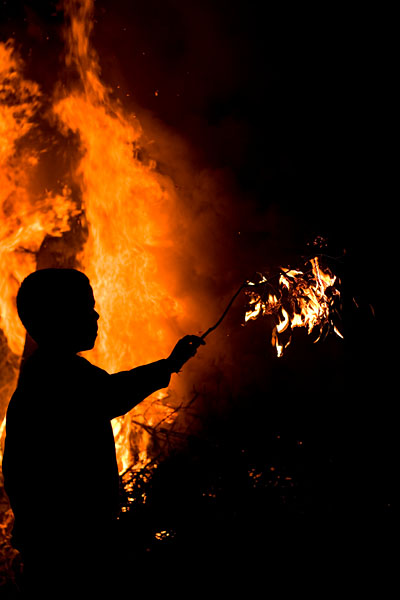
bonfire silhouette II
Forrestdale, Western Australia
Canon EOS 350D, 50mm f/1.8 @50mm, 1/400 sec, f/2.5, ISO200 This photo was taken at the same location as a bonfire silhouette photo taken several years ago. posted Thursday, 24 July 2008, 23:08 (+0800), by Martin
In November 2007, while attending the
Red Bull Air Race qualifying
in Perth with a friend, I took a a number of photos of some of the many police officers
who were in attendance in the crowd.
Along with photos of the various Red Bull aeroplanes, I also published
a photo of two police officers in my Red Bull photo gallery.
Several weeks ago, I received the following email, which referenced the image of the two police officers:
Subject:
Date: Mon, 16 Jun 2008 15:06:26 +0800 From: (name removed) <(email removed) @ hotmail.com> To: <mpot (at) martybugs.net> Hi there. Recently my friend was browsing through your internet page and noticed a photo on the following address ; martybugs.net/gallery/photos/(imagename removed) It was forwarded to me as he was concerned. This photo is one of my self and my partner I full police uniform from last years red bull airrace. With all due respect, could you please remove this photo, as my permission was not given to have the photo taken, nor was permission given to have it placed on the internet. I would appreciate a reply when you have conpleted this task. (name removed). posted Sunday, 20 July 2008, 22:05 (+0800), by Martin
By today's standards, we have a pretty large back yard. While I'm not a very keen gardener,
and often find it difficult to motivate myself to do the gardening.
However, the kids love the large back yard, and are often out there,
kicking a ball around on the lawn, on the swings, in the sandpit, or in the cubby house.
Earlier today, I followed the kids around in the back yard with my camera, as kids playing can often provide great opportunities for candid shots. Here's some of the photos of my youngest daughter, Samantha (17 months old), enjoying the back yard. Click each image for a larger version.
posted Saturday, 19 July 2008, 12:55 (+0800), by Martin
Taken from the Fossil Rock Lookout, near the Blowhole in Eaglehawk Neck, Tasmania.
Unfortunately it was a wet and miserable day when we were here, but I love the dark brown tones of the rocks and cliff face. 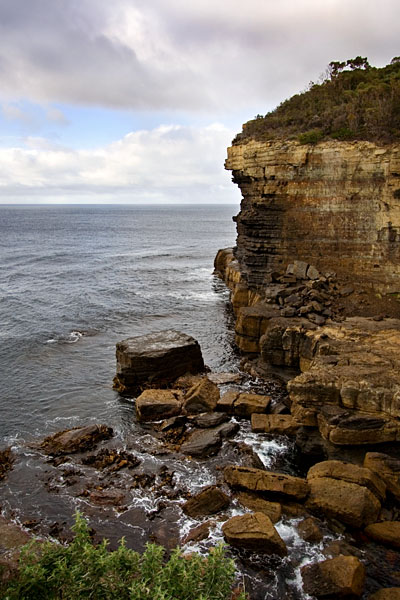
Fossil Rock Lookout
Eaglehawk Neck, Tasmania
Canon EOS 350D, 10-22mm @17mm, 1/125 sec, f/9, ISO200 posted Wednesday, 16 July 2008, 21:55 (+0800), by Martin
I recently ordered a
canvas print
of one of
my photos
from
RedBubble.com,
an Australian-based company that provides print-on-demand services.
You can buy prints of your own photos from RedBubble, or you can buy prints of
any of the many high quality photos uploaded by other RedBubble users.
I've previously ordered greeting cards from them (great quality!), but this was the first canvas print I've bought through RedBubble, and I decided to write this review to allow people to see what a canvas print from RedBubble looks like. I ordered the large canvas version of this image, which works out at a size of 610x311mm. The completed canvas print was delivered about 8 business days after being ordered online (published times for standard delivery are 10-15 business days), and was securely packaged in cardboard, bubblewrap and plastic. After unpacking the canvas print, I took a closer look at it, and was surprised at how much detail had been retained in the image. Some canvas prints lose a lot of details due to the texture of the canvas, but the texture of the canvas used by redubble is subtle enough to ensure detail is preserved.
posted Tuesday, 15 July 2008, 19:55 (+0800), by Martin
My youngest daughter is fascinated with my camera.
This makes it difficult to get photos of her, as she immediately heads towards
the camera when she sees it in my hands.
She particularly likes to see the results on the rear screen after I've taken a photo. Maybe she's an aspiring photographer who can't wait to take her own photos ;-) 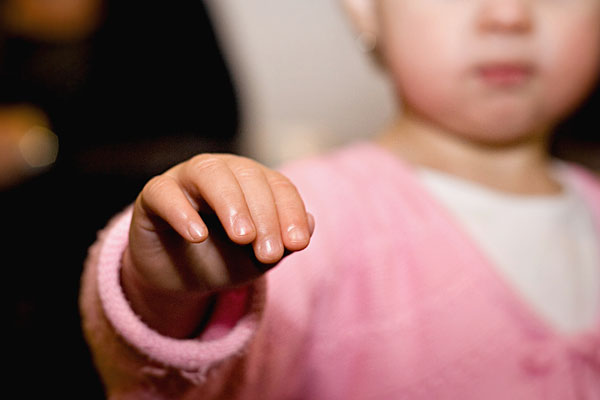
reach
home, Western Australia
Canon EOS 350D, 50mm f/1.8 @50mm, 1/60 sec, f/3.2, ISO200 However, on rare occasions, she'll pose for the camera. This typically occurs when she's found something that's more interesting than the camera - often something she's not supposed to be touching. In this particular case, she was experimenting with my wife's sudoku book and pen that was on the coffee table. 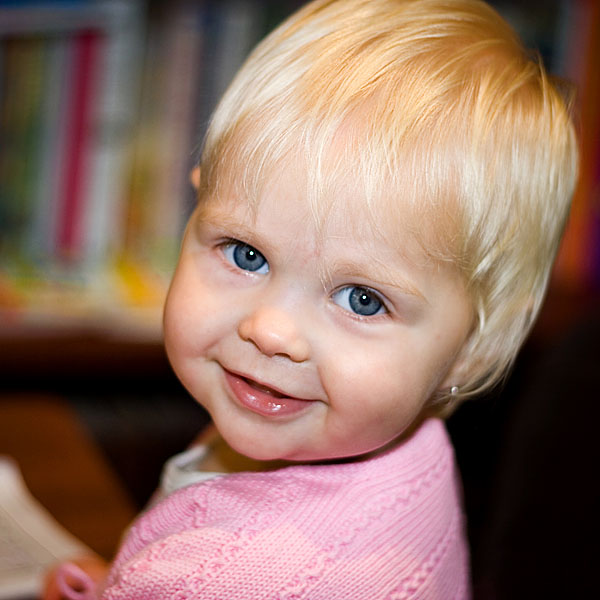
smile!
home, Western Australia
Canon EOS 350D, 50mm f/1.8 @50mm, 1/80 sec, f/1.8, ISO200 posted Sunday, 06 July 2008, 22:20 (+0800), by Martin
The Tessellated Pavement is located just north of Eaglehawk Neck, in Tasmania.
Nearby, a number of other geological attractions are located, including the Tasman Arch, Devil's Kitchen,
and the Blowhole.
However, the Tessellated Pavement was the most intriguing for me, with the rock formation looking very much like it was man-made, due to the very straight and parallel lines in the rock formation. There are two main types of formations in the Tessellated Pavement, with the pan formations (as shown in the two photos below) being concave (ie, pan-shaped), and the loaf formations (to be shown in a future blog post) being convex like a loaf. 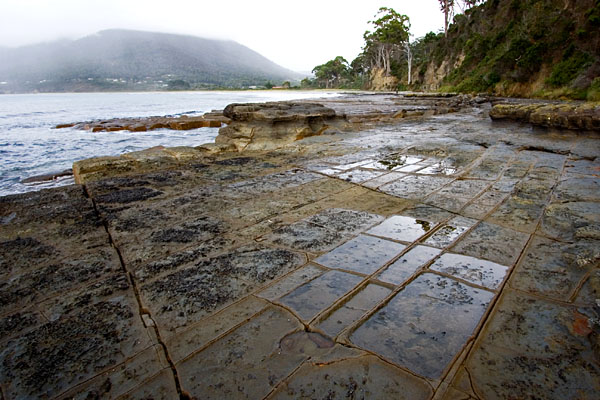
pan formations at the Tessellated Pavement
Eaglehawk Neck, Tasmania
Canon EOS 350D, 10-22mm @12mm, 1/40 sec, f/9, ISO200 posted Sunday, 06 July 2008, 22:05 (+0800), by Martin
Gear Obsessions
Earlier today, a friend pointed me at an interesting blog post about how many photographers obsess with gear, and always needing to upgrade a body or lens... It's a worthwhile read, and serves as a great reminder for all photographers out there to focus on their photos, and not the gear they think they need/want ;-) Also from the same blogger, a humorous look at the realisation that he has too much gear, and sells most of it to buy the "dream" camera he thought was too expensive....not realising just how much money he had already spent on gear anyway! Age of Canon Lenses
On another note, if you've ever wondered how to tell the age of a Canon lens, here's some info on making sense of the date code that's on most Canon lenses. A quick look through my lenses indicates L lenses have a date code, but my other lenses don't have one. Attorney Interview - copyright, model releases, shooting in public
Scott Kelby recently interviewed an attorney to discuss various topics, including copyright, model releases, and shooting in public. While it's primarily US-focused, there's still some interesting content for people in other countries. posted Saturday, 05 July 2008, 12:40 (+0800), by Martin
While not specifically photography-related, I thought I'd post this information,
as all webmasters and people running websites should be aware of it,
as AVG LinkScanner could be causing additional bandwidth usage on your websites, and falsely
inflating your website hit counts.
Also, anyone with AVG Anti-Virus Free 8.0 needs to be aware of this behaviour, that it will consume additional download quota as LinkScanner queries every result on a search engine results page, and that it is having a negative impact on websites. posted Thursday, 03 July 2008, 22:00 (+0800), by Martin
While in Tasmania in May, we visited the
Devils @ Cradle
wildlife park. Devils @ Cradle have a captive-breeding program,
with 20 Devils on-site. They also monitor wild Devils in the Cradle Mountain area.
When we visited, they had several female Devils which were thought to be pregnant.
This particular Tasmanian Devil is a small female named Charlotte. I like this photo because it shows the Devil in the classic screaming posture, with her mouth wide open. 
Charlotte the Tasmanian Devil
Devils @ Cradle, Cradle Mountain, Tasmania
Canon EOS 350D, 70-200mm f/4L @200mm, 1/80 sec, f/4, ISO200 Tasmanian Devils have a reputation for making lots of noise, and the specimens at Devils @ Cradle were no exception. They screeched and screamed a great deal while we were there. Apparently the screaming is not really a show of aggression - it is done to intimidate their enemies (including humans). posted Tuesday, 01 July 2008, 20:20 (+0800), by Martin
Here's an overview of all the photos I blogged during the month of June, with all
the photos coming from my recent
Tasmanian holiday.















Click any image to navigate directly to that blog post. Some of the other posts from June include:
posted Monday, 30 June 2008, 20:05 (+0800), by Martin
Review of the Situation
In my previous post on copyright violations, I described the situation which inspired me to write about this topic:
While reading an employee-only internal newsletter published by my employer, I
happened to recognise a photo that had been used in the headline of the newsletter,
and was also used on the company intranet (linking to the newsletter).
That particular photo is available on my website, and is clearly labelled as a copyrighted image. No-one had requested my permission to use the photo. If you notice that a colleague has "stolen" one of your photos, and is using it without your permission in an internal employee-only publication, what would you do? Options?
I could have responded in numerous ways - including taking no action. At the other extreme, I could also have sued, claiming improper use of my copyrighted image. posted Sunday, 29 June 2008, 09:30 (+0800), by Martin
On a recent Tasmanian holiday,
while in Hobart, we drove up Mount Wellington, hoping to enjoy the view
from the top of the mountain.
However, the top of the mountain was surrounded by thick fog, reducing
visibility to almost nothing.
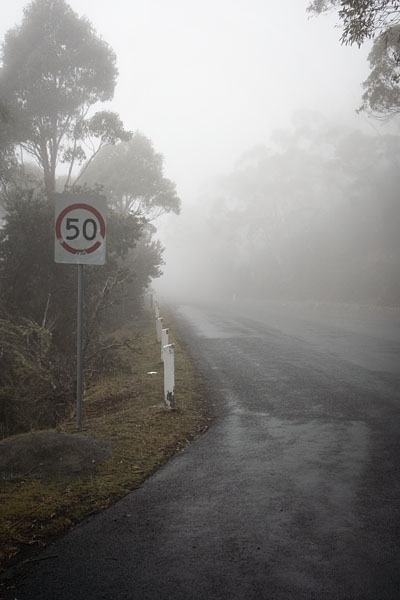
optimistic speedlimit
Mt Wellington, Hobart, Tasmania
Canon EOS 350D, 10-22mm @22mm, 1/125 sec, f/8, ISO200 posted Thursday, 26 June 2008, 00:15 (+0800), by Martin
The Tamar Islands Wetlands are just a short drive north of Launceston,
and there's a 3km boardwalk leading from the carpark, across the river, and onto
Tamar Island. There's plenty of flora and fauna to see, and the photo below shows
the grass that lines the majority of the boardwalk.

grass detail
Tamar Island Wetlands, Launceston, Tasmania
Canon EOS 350D, 70-200mm f/4L @100mm, 1/320 sec, f/4, ISO100 posted Sunday, 22 June 2008, 20:45 (+0800), by Martin
On a recent holiday in Tasmania,
we visited the Liffey Falls. They are located in central Tasmania, approximately 10km
north of the Great Lake.
The road to Liffey Falls is very narrow, with plenty of corners
(and a small wooden bridge),
so you need to take your time while driving. The road to the top carpark is signposted as being
suitable for short-wheelbase vehicles only, so buses and caravans need to take an alternative
route to the lower carpark (which has less facilities, and requires a longer walk to the falls).
However, the slow drive means you can enjoy the wonderful green scenery of the temperate rainforest.
Once at the Liffey Falls carpark, the actual falls themselves are still a 25 minute walk away. It's a pleasant walk through the rainforest, and you pass by a number of smaller cascades on the way to the main falls. The photo below shows the main falls. To get this view, I had to cross the river, and had one leg of my tripod resting in the water. To fully appreciate this photo, be sure to click on it to view a larger version. 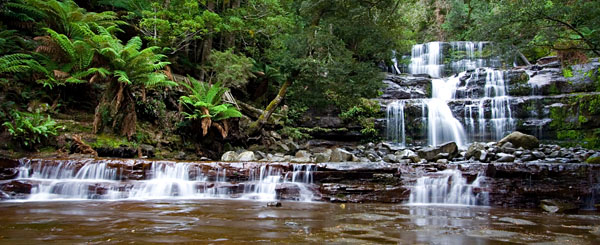
Liffey Falls
Liffey Falls, Tasmania
Canon EOS 350D, 10-22mm @15mm, 2.5 sec, f/16, ISO100 posted Saturday, 21 June 2008, 23:25 (+0800), by Martin
I encountered this wooden bridge on the way to Liffey Falls, in central Tasmania.
The road to Liffey Falls is particularly narrow, with lots of sharp corners that
need to be navigated slowly.
On the morning we visited Liffey Falls, we didn't encounter any other cars
or people on the road, or on the walk trail to the falls themselves.
Due to the relatively low light levels caused by the overhead trees, this photo was taken with a tripod, with an exposure time of nearly one second. 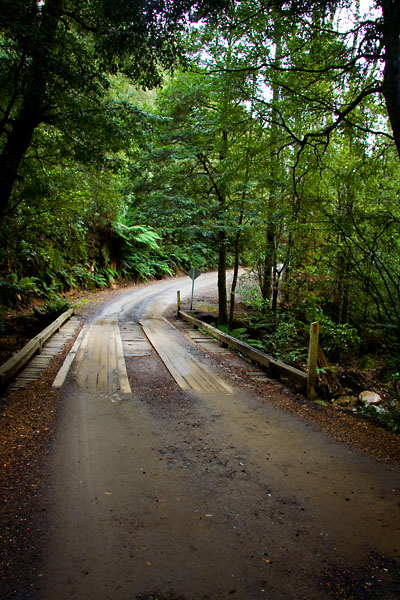
wooden bridge
Liffey Falls Track, Tasmania
Canon EOS 350D, 17-85mm IS @17mm, 8/10 sec, f/9, ISO200 posted Thursday, 19 June 2008, 20:40 (+0800), by Martin
While on a short boat cruise on the Marana at the historic Port Arthur site
in Tasmania, the sun made several brief appearances through the rain.
The rainbow below was the result of one of these brief appearances of the sun.
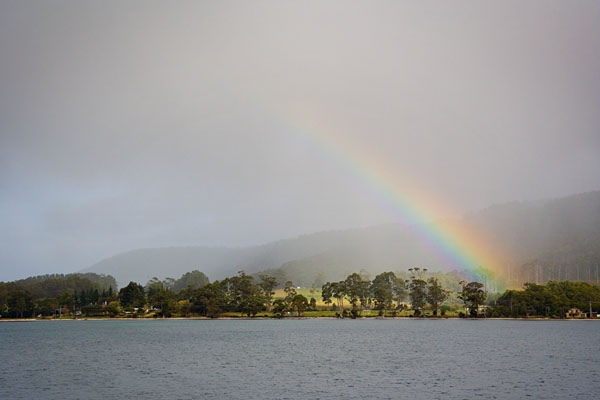
rainbow
Port Arthur, Tasmania
Canon EOS 350D, 17-85mm IS @50mm, 1/400 sec, f/8, ISO200 posted Tuesday, 17 June 2008, 21:45 (+0800), by Martin
The photos below typify the Tasmanian countryside for me - lots of green
rolling hills, and mountains in the distance.
While driving through Tasmania on a recent holiday, we frequently stopped on the side of the road to take photos of scenes such as this. 
grazing
central Tasmania
Canon EOS 350D, 17-85mm IS @85mm, 1/200 sec, f/9, ISO100 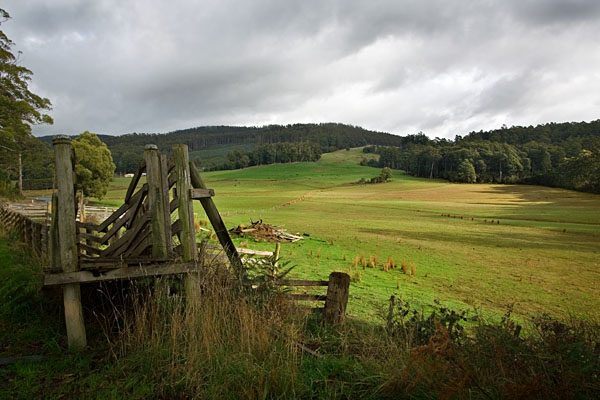
green carpet
Eaglehawk Neck, Tasmania
Canon EOS 350D, 10-22mm @12mm, 1/100 sec, f/9, ISO100 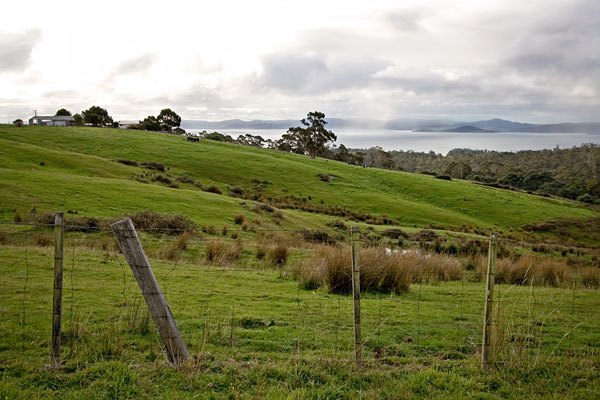
rolling hills
Tasman Peninsula, Tasmania
Canon EOS 350D, 10-22mm @22mm, 1/320 sec, f/6.3, ISO200 The first photo was taken in central Tasmania, the second somewhere near the northern end of the Tasman Peninsula (near Eaglehawk Neck), and the third was taken along the west coast of the Tasman Peninsula. posted Monday, 16 June 2008, 19:55 (+0800), by Martin
Stolen Photo - a Recent Experience
This blog post was inspired by an issue which recently occurred in my own workplace. Several months ago, while reading an employee-only internal newsletter published by my employer, I happened to recognise a photo (shown below) that had been used in the headline of the newsletter, and was also used on the company intranet (linking to the newsletter). That particular photo is available on my website, and is clearly labelled as a copyright image that cannot be used without permission. No-one had requested my permission to use the photo. 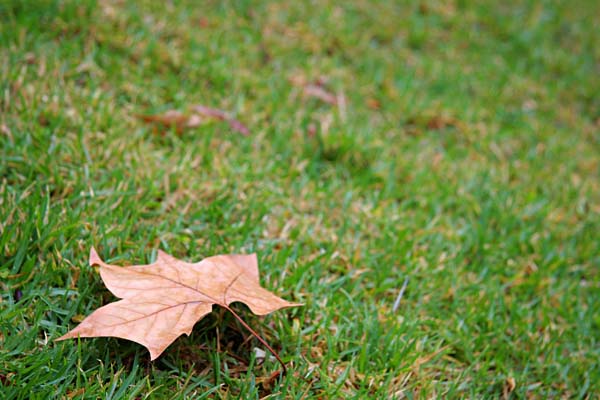
the stolen photo - lonely autumn leaf
Matilda Bay, Western Australia
Canon EOS 350D, 17-85mm IS @76mm, 1/125 sec, f/5.6, ISO400 Some digging through my webserver logs indicated that a colleague had found the image while doing a Google image search for images relating to autumn. I only happened to see the photo in the publication because I'm an employee of the company, and hence have access to this particular newsletter. If the photo had been used in any other company, I wouldn't have noticed! What would you do?
If you notice that a colleague has "stolen" one of your photos, and is using it without your permission in an internal employee-only publication, what would you do? Post details on how you would respond using the comments facility below. I'll be posting details in a future blog post on how this particular issue was handled. Edit: I've posted a follow-up article here. posted Sunday, 15 June 2008, 15:10 (+0800), by Martin
I took this photo while lying on the ground, attempting to get some photos of
my active 15 month old daughter.
It was only afterwards that I realised this was a suitable entry for Neil Creek's Iron Chef Photography - Shoes competition. 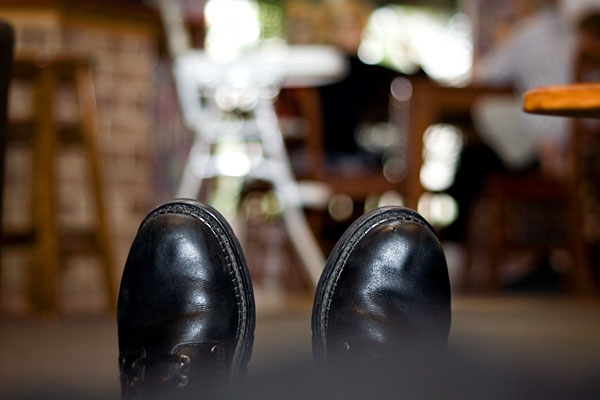
shoe view
home, Western Australia
Canon EOS 350D, 50mm f/1.8 @50mm, 1/60 sec, f/2, ISO200 posted Thursday, 12 June 2008, 22:00 (+0800), by Martin
Here's a slightly different view of the Penitentiary at the well-known historical site of Port Arthur,
in Tasmania.
After drizzling for most of the day, the sun came out for a brief period of time, providing great lighting on the grass and the Penitentiary. It also resulted in a rainbow, as seen in the top left of the photo, with the recognisable shape of the Penitentiary in the background. The lichen on the paling fence was particularly interesting, so I went for a wide open aperture, and focused on the fence. What do you think? Feel free to provide feedback by adding a comment. 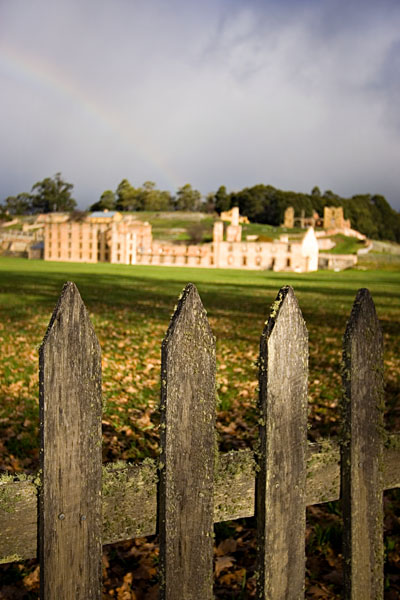
fence detail
rainbow over the Penitentiary
Port Arthur, Tasmania
Canon EOS 350D, 10-22mm @20mm, 1/800 sec, f/4.5, ISO100 posted Monday, 09 June 2008, 23:00 (+0800), by Martin
The Batman Bridge, which crosses the Tamar River in northern Tasmania.
It was built in the late 1960s, and was the first cable-stayed bridge in Australia.
This long exposure was taken just after sunset, with headlights of cars traversing the bridge providing some lighting of the railing on the top of the bridge. 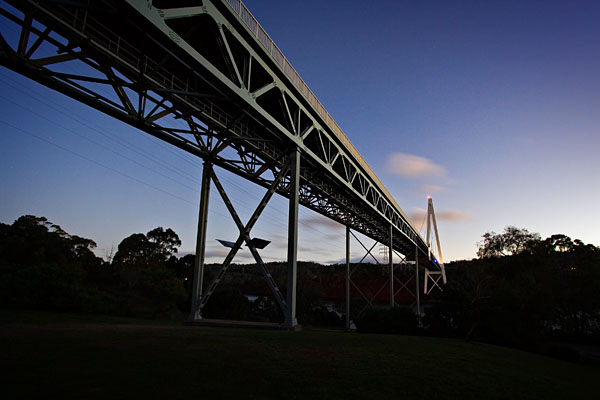
Batman Bridge at dusk
northern Tasmania
Canon EOS 350D, 10-22mm @10mm, 30 sec, f/7.1, ISO200 posted Sunday, 08 June 2008, 22:00 (+0800), by Martin
This is the Tasman Bridge, which crosses over the Derwent River in
Hobart, Tasmania.
This photo was taken from Rose Bay, on the east bank of the Derwent River.
This bridge gained a lot of media attention in 1975, when a section in the centre of the bridge collapsed after one of the bridge's pylons was hit by the bulk ore carrier Lake Illawarra. Four cars fell off the bridge, killing five people, and seven crew members on the Lake Illawarra drowned when the ship sank. 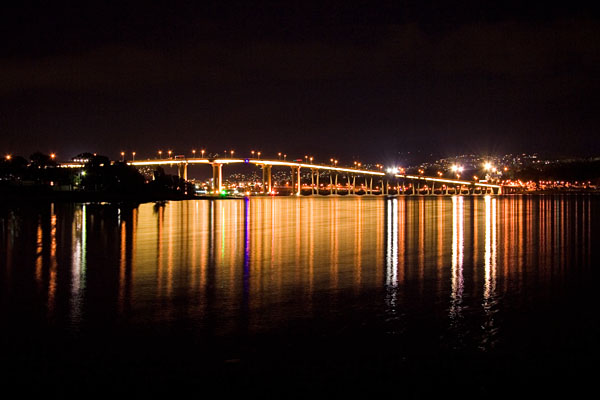
Tasman Bridge at night
Hobart, Tasmania
Canon EOS 350D, 17-85mm IS @35mm, 20 sec, f/9, ISO100 posted Thursday, 05 June 2008, 22:20 (+0800), by Martin
Here's another photo from our recent
holiday in Tasmania,
with the morning sun back-lighting the fence and the grass, which
is covered in frost.
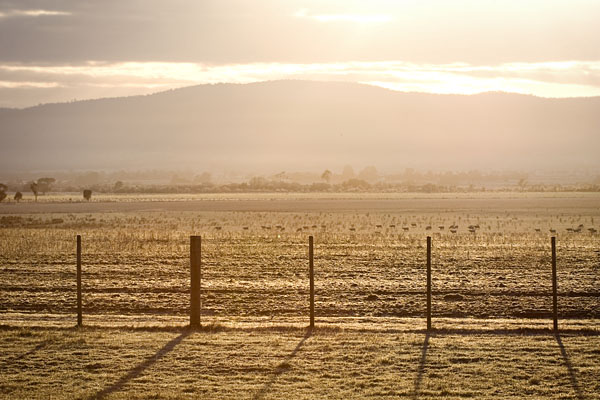
sun-lit fence and frosty grass
Tasmania
Canon EOS 350D, 100mm f/2.8 macro @100mm, 1/320 sec, f/9, ISO200 posted Wednesday, 04 June 2008, 21:50 (+0800), by Martin
Here's another photo from a recent
holiday in Tasmania.
This is looking down the rivermouth of a river at Denison Beach, on the east coast of Tasmania, a few kilometres north of Bicheno. In the distance, the beach and ocean is visible. The sky was almost cloud-free, with just a few small clouds visible above the horizon. I like the subtle sun-rays visible at the top left of the photo (click the photo to view a larger version). 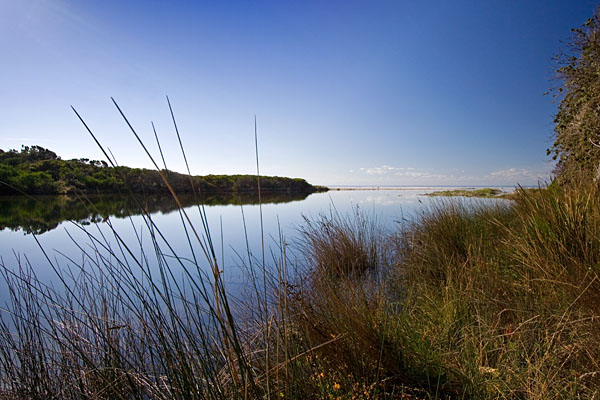
mirrored sky
rivermouth at Denison Beach, Tasmania
Canon EOS 350D, 10-22mm @15mm, 1/100 sec, f/9, ISO100 posted Tuesday, 03 June 2008, 20:50 (+0800), by Martin
Taken during a recent
holiday in Tasmania,
I tried to capture the morning sun highlighting the frost on the trees and grass.
I'm not sure exactly where this was, but it is just south of Launceston, taken early in the morning as we headed east out of Launceston, on our way down the east coast, towards Hobart. 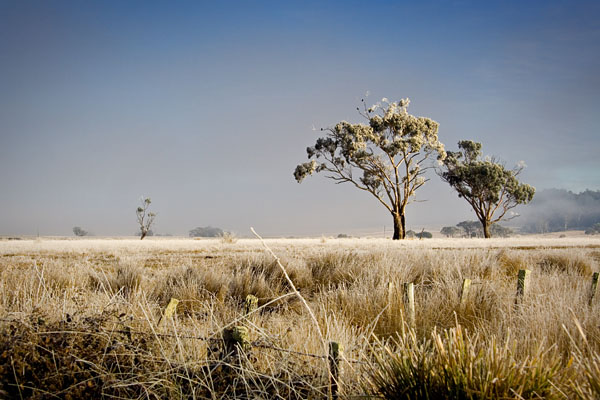
morning sun on frosty trees and grass
Tasmania
Canon EOS 350D, 17-85mm IS @41mm, 1/320 sec, f/8, ISO100 One of the things I really enjoyed about this holiday in Tasmania is that we could just stop on the side of the road whenever a photo opportunity presented itself. Many of the landscape photos I took while in Tassie were just that - scenes that looked interesting while driving, and hence warranted a quick stop to take some photos. posted Monday, 02 June 2008, 20:40 (+0800), by Martin
I recently had to go to Tasmania for a couple of days work in Bell Bay (northern Tasmania).
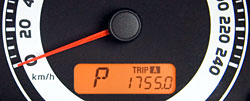
Due to the limited time, we planned our trip, to ensure we were making effective use of the time we had. We started in Launceston, then drove east to St Marys, and sampled the fantastic pancakes at Mount Elephant Pancakes, before continuing down the east coast. In Freycinet National Park, we did the Wine Glass Bay lookout walk, and then continued down to Hobart. One day was spent visiting Eaglehawk Neck and Port Arthur, and we headed back to Launceston for the weekend, before going south again, to Lake St Clair, and then upto Cradle Mountain for a few nights. We had a great time, and loved the Tasmanian scenery. Although the weather was overcast and drizzling some of the time, we didn't let that stop us, and still did plenty of sight-seeing. Tasmania was appealing for several reasons. Firstly, it's the place of my birth, and I haven't been back since I was four years old. Secondly, there's a lot of Australian history in Tasmania, particularly in places such as Port Arthur. While the Port Arthur history may not always be exotic (a convict's life was pretty miserable and harsh), it's still Aussie history. Thirdly, I have heard plenty of stories from people about how green the country side is, and the natural beauty of places such as Tasman's Arch, the waterfalls, the rainforest, etc. I took lots of photos during the week in Tasmania, and will be posting some of them on this blog over the coming weeks, along with some more stories and commentary. Edit: here's some of my photos from Tasmania (click a thumbnail to go to the corresponding blog entry): 




























posted Sunday, 01 June 2008, 12:20 (+0800), by Martin
Here's an overview of all the photos I blogged during the month of May.














Click any image to navigate directly to that blog post. Note that I'm not only posting photos - I also wrote several posts in May, including:
posted Sunday, 18 May 2008, 14:10 (+0800), by Martin
While on a drive around the south west of Phuket, we stopped at the
Kata View Point
to enjoy the view.
Some locals were there, with some tame sea hawks and sea eagles.
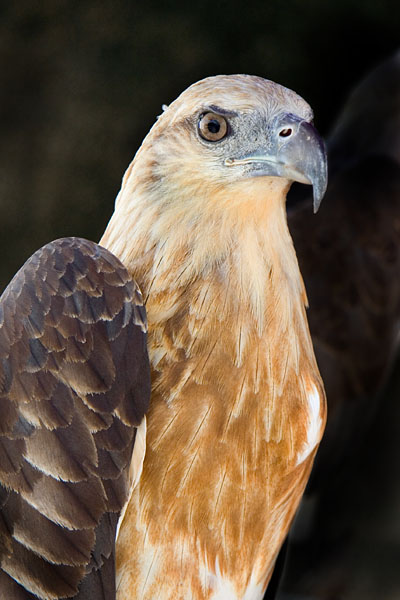
sea hawk
Kata View Point, Phuket Thailand
Canon EOS 350D, 17-85mm IS @85mm, 1/200 sec, f/5.6, ISO200 They referred to the one shown above as a "sea hawk", but after some research, I think it may be an Osprey. posted Friday, 16 May 2008, 20:50 (+0800), by Martin
Every now and then, I'll be doing a Quick Links post, where I provide some brief info
and links to interesting stories/articles.
This first Quick Links post focuses on photographer's rights.
A Los Angeles photographer recently received a suprise visit from two agents from the FBI Joint Terrorism Task Force after a photoshoot at the Port of Los Angeles. From the original post:
They informed me that most of their job lately has been following up with photographers who take photos in the port complex. They also informed me that they try their best to inform private security guards how to deal with confrontations with photographers, and that most of the guards have a bit of a skewed view on what's legal (oh my god this is true), and they're trying to correct that. They have had to correct guards who have insisted that photos be erased, or worse, have confiscated equipment in the name of homeland security.
Maybe one of these
OCAU photography shirts would have helped:

OCAU photographer shirt
John Forrest National Park, Western Australia
Canon EOS 350D, 17-85mm IS @79mm, 1/3200 sec, f/5.6, ISO200 Do you know your rights as a photographer? If not, then I would strongly recommend you read on to find out more about your rights. posted Thursday, 15 May 2008, 22:00 (+0800), by Martin
The view from the Kata View Point is a great vantage point with a great view.
The bay nearest to the view point is Kata Noi Beach, the next one is Kata Beach, and the last one is Karon Beach. Patong Beach is on the far side of the hills on the far side of Karon Beach. The small island visible on the left is Pu Island. Unfortunately, it was overcast almost every day we were there, so we didn't get blue skies. However, I like the green vegetation framing this photo. 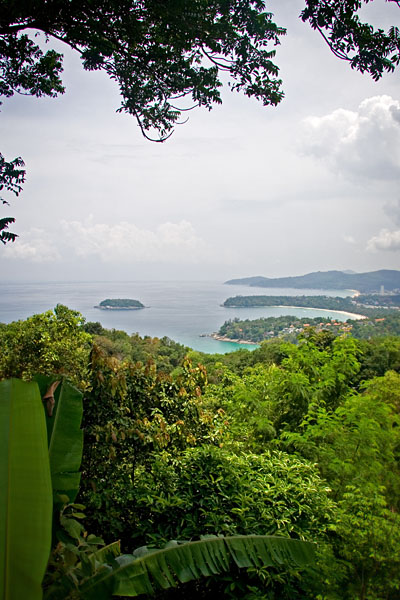
Kata Beach and Karon Beach
as seen from the Kata View Point
Kata View Point, Phuket Thailand
Canon EOS 350D, 17-85mm IS @17mm, 1/400 sec, f/9, ISO200 posted Wednesday, 14 May 2008, 23:30 (+0800), by Martin
While in Phuket recently, we went for a drive around the south of Phuket.
We stopped for lunch in Chalong Bay, during some heavy rain. After lunch,
the rain stopped, and I went for a brief wander along the beach.
I came across this boat, and snapped a few photos of it.
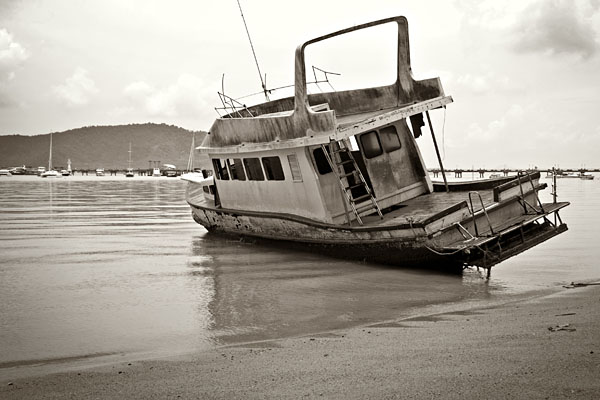
aground
Chalong Bay, Phuket, Thailand
Canon EOS 350D, 17-85mm IS @30mm, 1/125 sec, f/10, ISO100 posted Monday, 12 May 2008, 21:10 (+0800), by Martin
During a business trip to Calgary (Alberta, Canada) in June one year,
I saw many mounds of dirt on the grass and around the paths in downtown Calgary.
The locals told me these were created by the local gophers, but it took a few days
before I saw a gopher in the flesh.
This photo was taken during a weekend visit to Banff and the surrounds in 2005, with my point-and-shoot Olympus C-770. The Olympus camera really helped my photographic progression, but also really frustrated me with some of its limitations, and thus helped me to make up my mind to buy a DSLR. 
Watchful gopher
Banff, Alberta, Canada
Olympus C-770 UltraZoom @63mm, 1/200 sec, f/3.7, ISO100 posted Sunday, 11 May 2008, 10:45 (+0800), by Martin
I've always believed that glass (ie, camera lenses) is more important than the camera body.
When I bought my first DSLR, a Canon 350D, rather than buy the Canon EF-S 18-55mm f/3.5-5.6 II kit lens, I
opted for the more expensive Canon EF-S 17-85mm f/4-5.6 IS lens.
I didn't see the point in putting a ~AUD$150 lens onto a ~AUD$1000 body!
Bill Wadman recently wrote about this in a blog post titled Glass (part one). He introduces the subject by saying:
If there is a place to spend the money, it's on the glass. I'd take a 5 year old 20D with a good lens over a top of the line 1Ds MkIII with a crappy lens any day of the week. I can't tell you the number of people I see who have this all wrong. Last year at the Grand Canyon, I saw a girl with a high-end Gitzo tripod, 5D body, and some crappy consumer level zoom lens on the front. Honestly, I almost pushed her over the edge.
Bill also goes on to discuss the benefits of prime lenses instead of zoom lenses.
Read Bill's article to see what else he has to say about choosing lenses. posted Sunday, 11 May 2008, 10:10 (+0800), by Martin
Dawn is a great time of the day for photos, and the photo below is one of my favourites
from a trip to Darwin and Jabiru in 2006.
It was taken at Mamukala Wetlands, near Jabiru, which is approximately 200km east of Darwin, in the Northern Territory. The water was very flat, and there was a bit of fog over the water as the sun came up. Everything is very still, and the only sign of life is the birds foraging for food. I like this photo, because it portrays the peacefulness and quietness of the dawn. 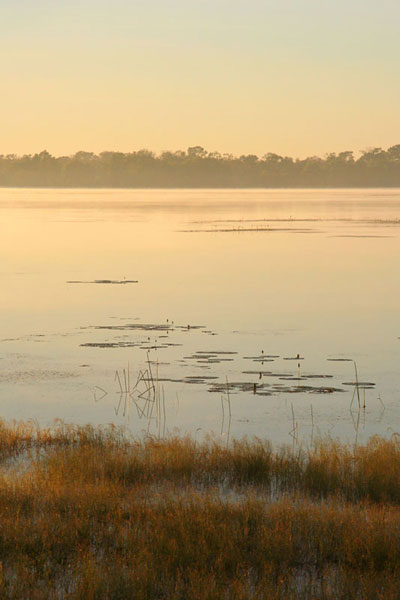
Dawn at Mamukala Wetlands
near Jabiru, Northern Territory, Australia
Canon EOS 350D, 17-85mm IS @85mm, 1/200 sec, f/10, ISO400 posted Wednesday, 07 May 2008, 22:45 (+0800), by Martin
Introduction
I recently went on an overseas holiday to Phuket, Thailand, and had a hard time deciding which lenses to take. On the one hand, I wanted to ensure I had lenses to cover the focal lengths and lighting conditions I might encounter, but on the other hand, I didn't want to have to carry around all my lenses all the time. In this post, I discuss the camera gear I took, and provide details on why I decided to take that gear. I also provide the results of some quick analysis of the photos I took, determining how I used the lenses I took, and which focal lengths were the most popular. This allows me to then review the choice of lenses, and provide some recommendations for other travelling photographers. posted Sunday, 04 May 2008, 21:55 (+0800), by Martin
posted Saturday, 03 May 2008, 15:15 (+0800), by Martin
This is a view inside Concourse C of the new Bangkok International Suvarnabhumi airport.
It's an an interesting design, and appears to consist
of sails stretched between sections containing windows.
There wasn't much colour in the original image, and I found the duotone version a little more interesting than the colour version. 
inside Concourse C, Bangkok International Suvarnabhumi airport
Bangkok, Thailand
Canon EOS 350D, 10-22mm @10mm, 1/15 sec, f/5, ISO200 posted Sunday, 27 April 2008, 22:35 (+0800), by Martin
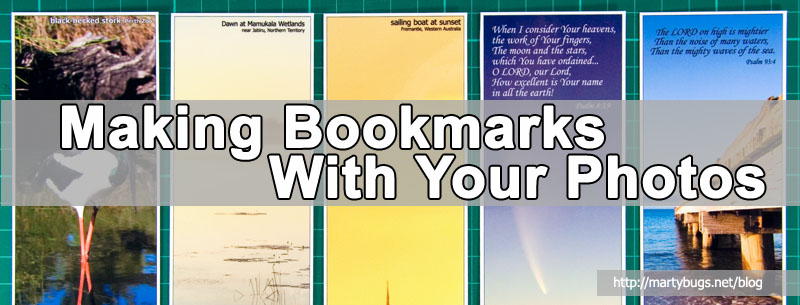
Overview
Producing bookmarks with your photos provides another mechanism for you to share your photos, and can also provide a way to publicise your website. Bookmarks can also make attractive gifts, and can easily be slipped inside an envelope along with a card. If you run a photography business, you can also use these bookmarks to advertise your business. 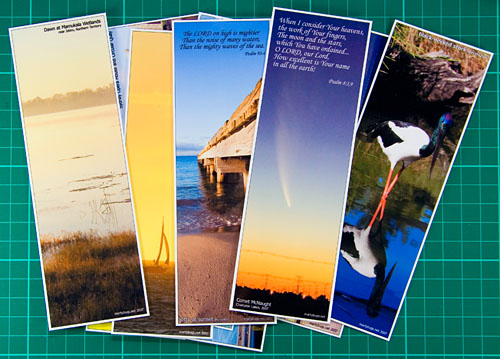
completed bookmarks
With photo-quality printers becoming cheaply and readily available, many people will be able to make these photo bookmarks at home. (However, many people may not have a laminator at home. Laminators are reasonably cheap, and many printing places provide laminating services. Alternatively, your workpace may have one, so ask if you can use it.) posted Saturday, 26 April 2008, 12:15 (+0800), by Martin
While in Phuket recently, we visited the Phuket Monkey School.
This is one of the monkeys at the school (note the chain around its neck).
I thought the duotone conversion adds to the gloomy feel of the photo, as the monkey waits for the next show to start. 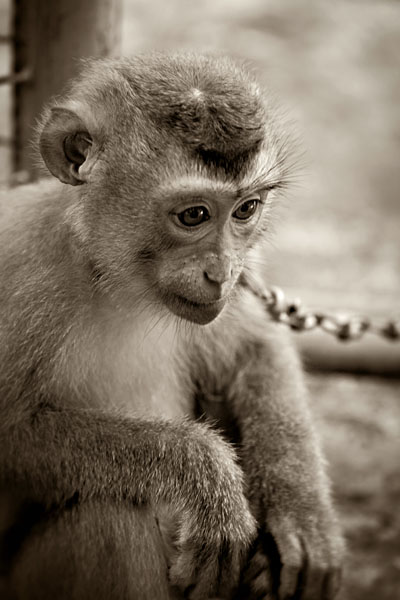
waiting
Phuket Monkey School, Phuket, Thailand
Canon EOS 350D, 100mm f/2.8 macro @100mm, 1/50 sec, f/2.8, ISO200 posted Sunday, 13 April 2008, 20:25 (+0800), by Martin
A couple of photos taken at AQWA (Aquarium of Western Australia),
through the aquarium glass.
Despite the high ISO, I was pretty happy with these shots. 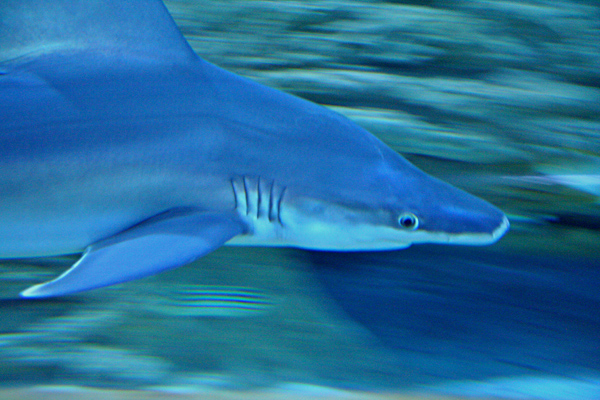
a shark speeding past
AQWA, Hillarys Boat Harbour, Western Australia
Canon EOS 350D, 17-85mm IS @44mm, 1/8 sec, f/5, ISO1600 posted Friday, 11 April 2008, 00:20 (+0800), by Martin
posted Tuesday, 08 April 2008, 22:35 (+0800), by Martin

On February 2007, the Australian Federal Government announced that incandescent light bulbs would be banned in Australia by the year 2010. Apparently that makes Australia the first country in the world to announce such a ban (ref 1, ref 2). The primary reason for this ban is to encourage the use of compact fluorescent lamps instead of incandescent globes, as CFLs use approximately 80% less electricity, thus reducing Australia's greenhouse gas emissions. Apparently by 2015, the switch to CFLs will reduce our greenhouse gas emissions by up to four million tonnes per year. posted Sunday, 06 April 2008, 10:35 (+0800), by Martin
I found this spider spinning a web on the washing line in the back yard.
All photos were taken with the Canon 100mm f/2.8 macro lens, along with a Canon 430EX flash with a homemade reflector attached to it. 
spider keeping watch
back yard at home, Western Australia
Canon EOS 350D, 100mm f/2.8 macro @100mm, 1/100 sec, f/9, ISO200 posted Wednesday, 02 April 2008, 21:35 (+0800), by Martin
Another photographer, silhouetted against the early morning sun on the Swan River in South Perth.
This photo was taken on an early morning photo-shoot with a few other amateur photographers.

photographer silhouette
South Perth, Western Australia
Canon EOS 350D, 70-200mm f/4L @70mm, 1/1000 sec, f/4, ISO100 posted Monday, 31 March 2008, 19:15 (+0800), by Martin
Here's a shot of the well-known Sydney Opera House, one of the Australian icons that is easily
recognised by many people around the world.
This was taken before dawn, while on a photoshoot with some local Sydney OCAU amateur photographers. It was a cold and windy morning, and the sunrise didn't provide very interesting colours, but I'm happy with some of the shots I got before the sun appeared, including the one shown below. 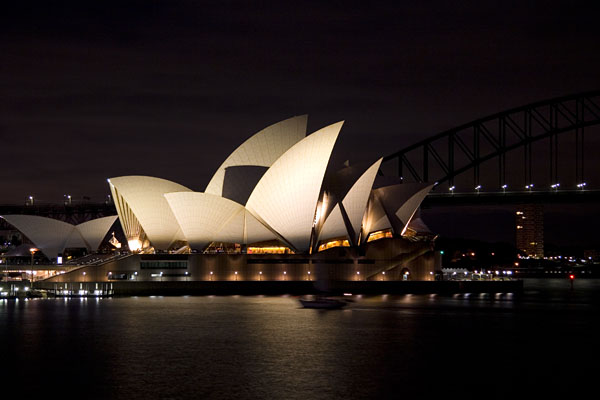
Sydney Opera House Before Dawn
Sydney, New South Wales, Australia
Canon EOS 350D, 17-85mm IS @64mm, 4 sec, f/5.6, ISO100 posted Saturday, 29 March 2008, 11:00 (+0800), by Martin
I was trying to get closer to these stilts, but they didn't appreciate my
approach, and flew off in the opposite direction. However, I managed
to get this shot as they flew off.
I like the colour gradient in the water, and the reflection of the birds on the ripples is particularly interesting. 
Black-winged Stilts flying over the lake
Bibra Lake, Western Australia
Canon EOS 350D, 70-200mm f/4L @200mm, 1/1600 sec, f/4, ISO100 posted Monday, 24 March 2008, 17:00 (+0800), by Martin
For anyone who has a set of extension tubes, here's a cheap and easy way to
protect them in your camera bag.
Just slide the extension tubes into a neoprene stubby/can holder.
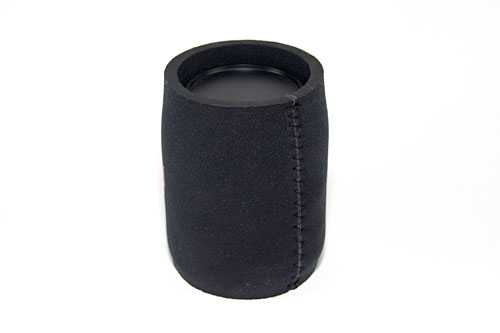
extension tubes securely protected inside a stubby holder
The thick neoprene provides a very thick and robust holder, protecting your extension tubes from getting scratched in your camera bag. A stubby holder is also significantly cheaper than a lens case designed specifically for photographic gear, particularly if you can get the stubby holders for nothing, as many companies give stubby holders away as promotional items, or alternatively, they can be purchased cheaply at many retail outlets as souvenir items. posted Saturday, 22 March 2008, 21:15 (+0800), by Martin
This seagull was snapped near the Barrack Street jetty in Perth, Western Australia, while on an early-morning photoshoot with a colleague.
I particularly like the colours and texture of the wooden post that the bird is standing on. 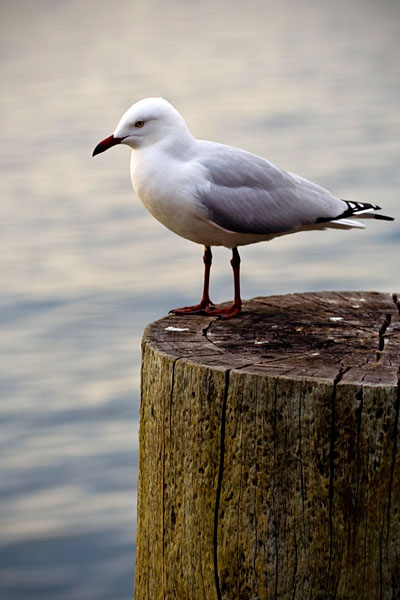
seagull
Perth, Western Australia
Canon EOS 350D, 70-200mm f/4L @118mm, 1/60 sec, f/4.5, ISO100 posted Friday, 21 March 2008, 21:50 (+0800), by Martin

Digital tilt-shift effects can be digitally applied to a photo, to give it the appearance of being a miniature model. I've previously blogged a tilt-shift photo of South Perth. The photo below shows a ferry heading into South Perth, with the Perth city skyline in the background, and has been digitally tilt-shifted using the advanced technique described below (click image for a larger version). 
ferry approaching South Perth
South Perth, Western Australia
Canon EOS 350D, 70-200mm f/4L @70mm, 1/500 sec, f/8, ISO100 This blog entry provides details on how to easily apply a basic tilt-shift effect to a photo, as well as details on a more advanced technique (using Photoshop CS2) that provides more realistic-looking miniaturised tilt-shift photos. posted Monday, 17 March 2008, 21:00 (+0800), by Martin
As a regular user of Google Reader (Google's web-based RSS reader),
I've become used to the keyboard shortcuts it supports to speed up navigation.
(If you use Google Reader, and were not aware of the keyboard shortcuts, hit "shift-?" in Google Reader to view the complete list of valid shortcuts.) I decided to implement something similar in my photo gallery, to allow keyboard shortcuts to be used to navigate through all photos in a gallery. Some quick Googling turned up plenty of sample javascript code for implementing this functionality. I ended up using sample code from a page titled Handling Keyboard Shortcuts in JavaScript. After a bit of coding, my photo gallery now supports the following keyboard shortcuts when viewing the contents of a gallery:
These use of the j and k shortcut keys is similar to that in Google Reader, and is very familiar to me, as j and k are used in vi (a linux text editor) for moving to the next and previous lines. posted Tuesday, 11 March 2008, 20:55 (+0800), by Martin
This shot was taken along Orchard Road, in Singapore, back in November 2005.
The fountain is in front of the Ngee Anne City shopping centre, and the temporary
tent structure between the fountain and the mall was there for a display of some sort.
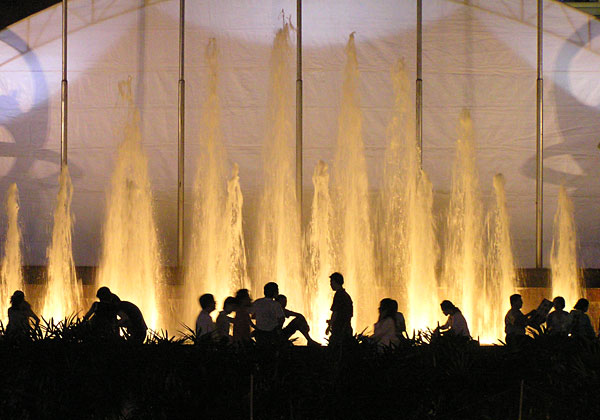
fountain at night
Orchard Road, Singapore
Olympus C-770 UltraZoom @18.5mm, 1/25 sec, f/3.2, ISO400 posted Monday, 03 March 2008, 12:50 (+0800), by Martin
Some ducklings on the grass in Kings Park.
We were having a picnic dinner on the grass, and some of the ducks were eating the bread crumbs
from right next to the kids. They weren't scared of people at all.
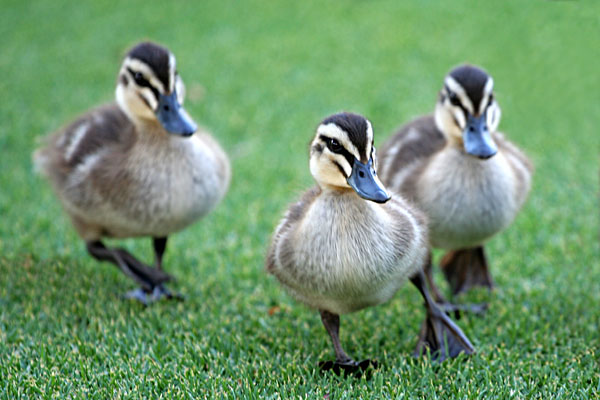
follow the leader
Kings Park, Western Australia
Canon EOS 350D, 70-200mm f/4L @200mm, 1/80 sec, f/4, ISO100 posted Sunday, 02 March 2008, 08:40 (+0800), by Martin
posted Tuesday, 26 February 2008, 20:20 (+0800), by Martin
The Narrows Bridge and South Perth, digitally tilt-shifted to make it look like a miniaturised model.
On the lower left is the Narrows Bridge over the Swan River, with the Kwinana Freeway snaking its way into the distance on the right hand side. Note that you should view the large version (by clicking on the image below) to properly appreciate the tilt-shift effect. 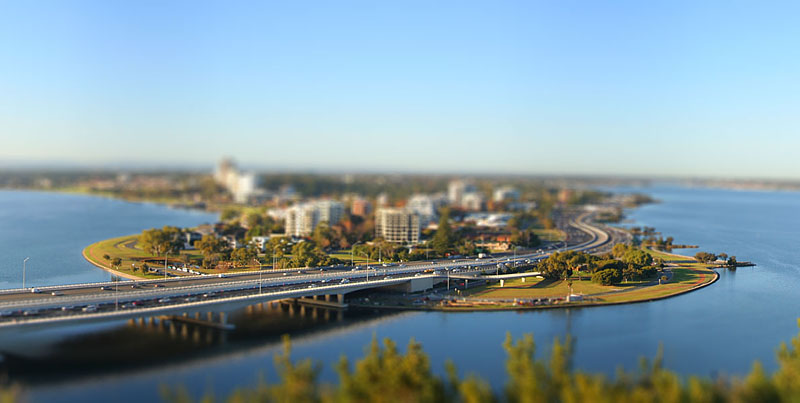
Narrows Bridge into South Perth
South Perth, Western Australia
Canon EOS 350D, 17-85mm IS @30mm, 1/400 sec, f/4.5, ISO100 posted Monday, 25 February 2008, 21:40 (+0800), by Martin
posted Saturday, 23 February 2008, 13:05 (+0800), by Martin
I found this mushroom in the back yard recently, and decided to try some photos
from a low angle. This photo was my pick of the photos I took.
To get this shot, I was lying on the ground in front of the mushroom, with the camera resting on the ground. 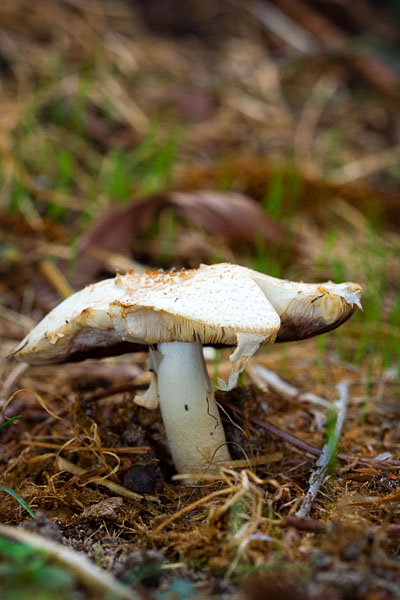
mushroom
back yard, Western Australia
Canon EOS 350D, 100mm f/2.8 macro @100mm, 1/80 sec, f/8, ISO200 posted Monday, 18 February 2008, 18:50 (+0800), by Martin
This little fellow was found on a
huge log
in a commemorative park in Jarrahdale, called the Centenary log.
Apparently the log is there to commemorate 100 years of logging in the Jarrahdale area.
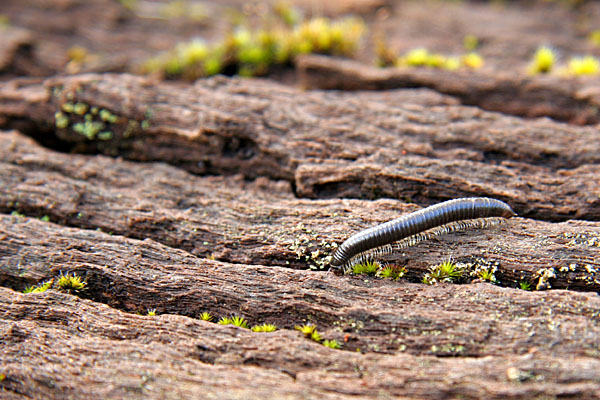
millipede on the Jarrahdale Centenary Log
Jarrahdale, Western Australia
Canon EOS 350D, 17-85mm IS @85mm, 1/30 sec, f/5.6, ISO100 posted Sunday, 17 February 2008, 19:10 (+0800), by Martin
posted Friday, 15 February 2008, 22:55 (+0800), by Martin
posted Sunday, 10 February 2008, 19:25 (+0800), by Martin
posted Saturday, 09 February 2008, 17:15 (+0800), by Martin
posted Wednesday, 06 February 2008, 17:30 (+0800), by Martin
Comet McNaught was discovered
by Robert H McNaught on 7 August 2006, and was the brightest comet in over 40 years,
being visible in the Southern Hemisphere in January and February 2007.
I can remember the excitement when Halley's Comet, visible every 75 years, was in our skies. Because comet viewing is a rare occurance (there's not too many comets that are visible to the naked eye), I wanted to be sure to capture some photos of Comet McNaught. 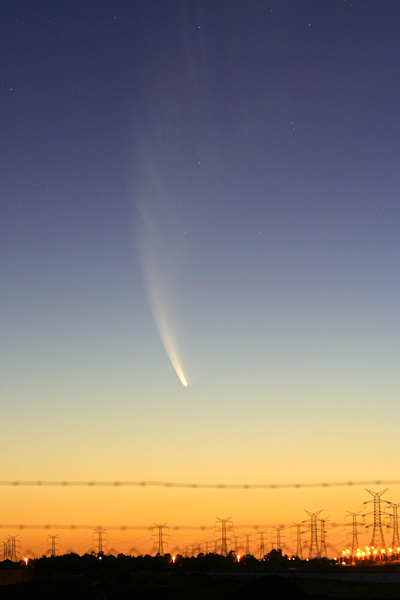
Comet McNaught
Champion Lakes, Western Australia
Canon EOS 350D, 70-200mm f/4L @87mm, 4 sec, f/4, ISO400 posted Tuesday, 05 February 2008, 21:00 (+0800), by Martin
When driving somewhere near Busselton, we came across this old shack, and I
had to stop and take some photos.
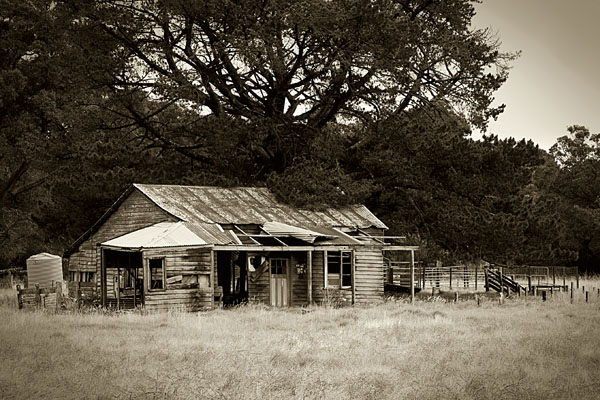
an old shack
Busselton, Western Australia
Canon EOS 350D, 17-85mm IS @64mm, 1/100 sec, f/9, ISO100 I thought the duotone conversion and some light vignetting added to the old feel of the photo. posted Monday, 04 February 2008, 19:45 (+0800), by Martin
These photos were taken while recently on holidays in Busselton.
Busselton is home to the longest wooden jetty in the Southern Hemisphere, and apparently the 2km-long jetty is one of the most photographed man-made structures in Western Australia. The photos below are not of this famous jetty. They are of a small jetty that is approximately 100m east of the famous jetty. I'm sure this small jetty isn't way as popular with the photographers, but the colours and lines appealed to me. 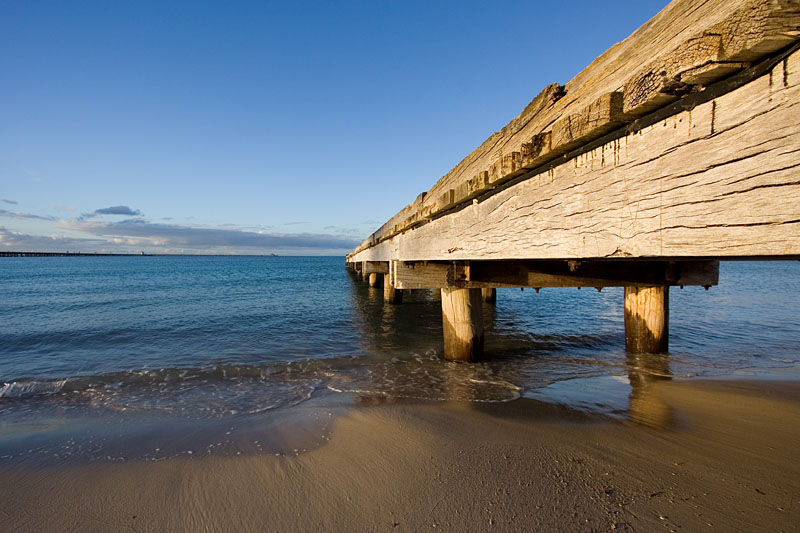
jetty at sunset
Busselton, Western Australia
Canon EOS 350D, 10-22mm @10mm, 1/100 sec, f/9, ISO100 | ||||||||||||||||||||||||||||||||||||||||||||||||
|
web by mpot.
all content and images are copyright
© 2001-2026 .
all rights reserved. unauthorised duplication, reproduction or distribution is prohibited. | ||||||||||||||||||||||||||||||||||||||||||||||||



































































































